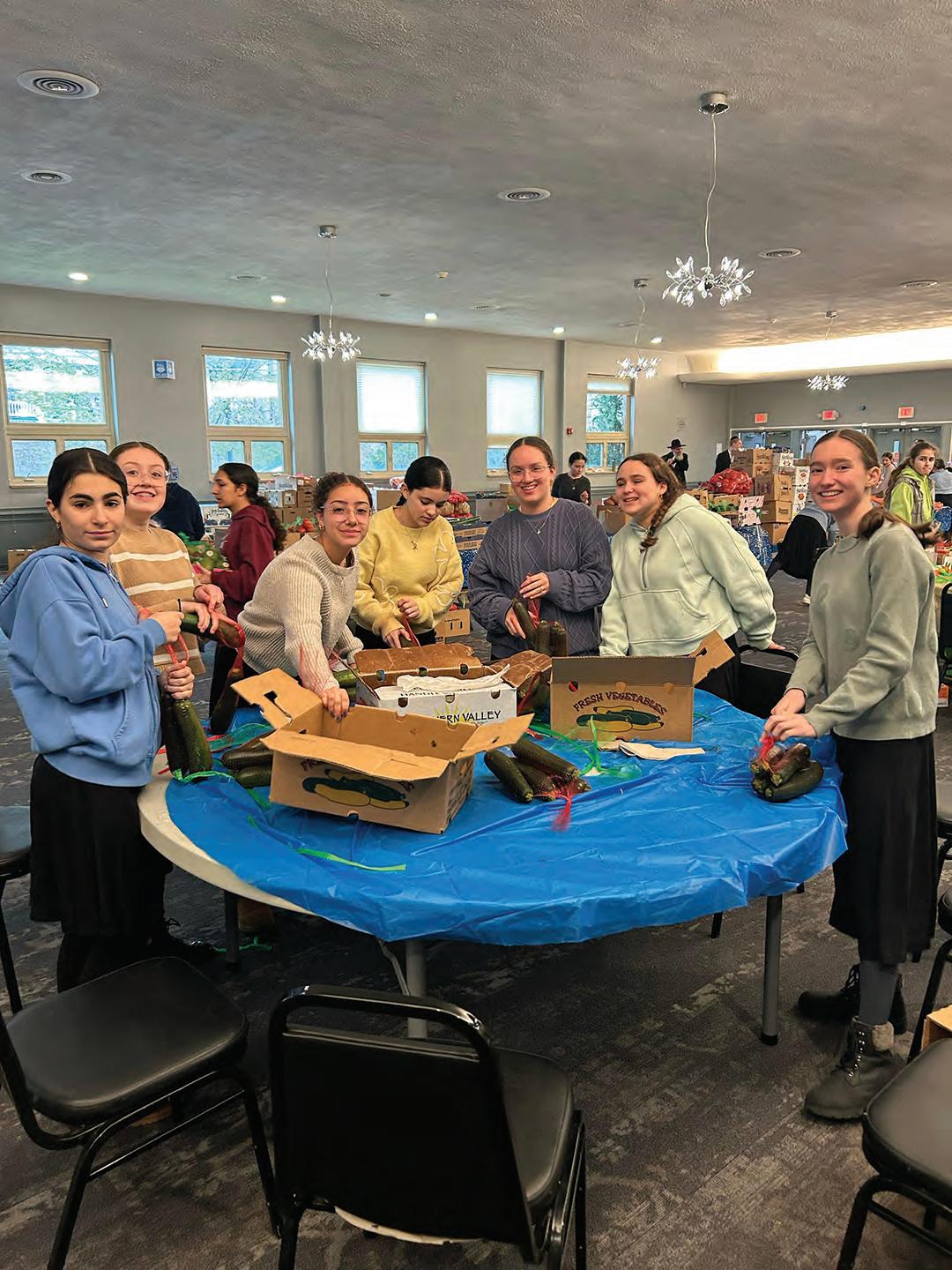











By David Rullo | Senior Sta Writer



Debbie Iszauk’s connection to Temple B’nai Israel goes back more than 65 years, when her parents joined in 1960. She’s readying for a final Shabbat at the Reform congregation, which has been a fixture in the White Oak/McKeesport communities since 1912.
Iszauk said she couldn’t recall why her family became members of B’nai Israel. The area still had two additional congregations at the time of their joining — Tree of Life Sfard and Gemilas Chesed.
“I don’t know why they made the choice,” she said. “I know my mother said it would be one of the two and not the third.”
Iszauk has fond memories of her semiweekly trips to B’nai Israel for Hebrew school, recounting spending 15 cents for the bus after elementary school before stopping for a 10 cent treat on her way to class every Tuesday and Thursday.
Friday night services, Sunday school, confirmation and youth group are among the connections she forged with the congregation before she left for college. When Iszauk returned to the region she joined another congregation with her family before finding her way back to B’nai Israel after her daughter was in college.
“We had a discussion that I really wanted to
come back to temple,” she said. “Coming back was this warm, wonderful feeling, a different building but the same people.”
Iszauk served on the board and for the last five years worked in the synagogue’s office. Now she’s readying for a final goodbye.
The congregation will celebrate its last Shabbat service on April 26 and spend the weekend recalling its historic legacy.
Temple B’nai Israel was formed in 1912, eventually finding a home on Shaw Avenue in McKeesport. And while it might be hard to imagine now, the Mon Valley town was once home to more than 6,500 Jewish residents, had four synagogues, numerous Jewish auxiliaries and a community religious school with its own board of education, according to Eric Lidji, director of the Rauh Jewish History Program & Archives at the Heinz History Center, who spoke to the Chronicle about the synagogue earlier this year.
The congregation moved to White Oak in 2000, after buying the Tree of Life Sfad’s building. At that time, the congregation had 170 family units. It now has somewhere between 30 and 40, according to the congregation’s president, Lou Anstandig, who noted that most members no longer live in White Oak.
By Toby Tabachnick | Editor
Prosecutors revealed new evidence last week regarding one of the defendants charged with vandalizing Chabad of Squirrel Hill and the Jewish Federation of Greater Pittsburgh in July.
According to a federal court filing, Mohamad Hamad, a Coraopolis resident who identified in a text message as a “Hamas operative,” shared an image of a firearm on Instagram in July with the text: “Alright yall say a prayer with me. Inshallah one day each bullet in this mag kisses the forehands of the Zionist oppressor, ameen.”
Hamad was arrested along with Talya Lubit last fall and charged with damaging religious property and conspiracy to comment an offense against the United States. The defendants are accused of painting antisemitic graffiti on Chabad of Squirrel Hill’s building, including an inverted red triangle, a symbol used by the terrorist group Hamas to identify Israeli military targets, and painting anti-Israel graffiti on a sign outside the Jewish Federation of Greater Pittsburgh’s building.
Hamad was a member of the Pennsylvania Air National Guard until Sept. 2024, when he was barred from the facility. Lubit is an Oakland resident.
Search warrants were executed in August and September at both defendants’ residences and their cell phones were seized. According to the U.S. Attorney’s Office, a review of the contents revealed messages between Hamad and Lubit “during which they planned their vandalism






By David Rullo | Senior Staff Writer
Matthew Gouwens is clear: Alt-right comedian Sam Hyde is not welcome at Hop Farm Brewing Company in Lawrenceville. He canceled a scheduled event with the comedian as soon as he learned of the performer’s hateful rhetoric.
The antisemitic, racist, homophobic comedian was scheduled, through promoter Hazy Heckler, to appear at the brewery on April 12. Gouwens and his wife, co-owner Emily Gouwens, were unaware of Hyde’s hate-filled material and comments before an online Chronicle article highlighted his history, which included mocking victims of the Pittsburgh synagogue shooting days after the attack.
“We hate everything that Sam Hyde stands for,” Matthew Gouwens told the Chronicle. “We were unaware of his history and affiliation with bigotry and antisemitism and the blatant actions he has taken to solidify these affiliations. These actions completely go against what we stand for personally, as a company and as a member of the Pittsburgh community.”
Matthew Gouwens said he has a Jewish employee, is friends with members of the LGBTQ+ community and “loves all people,” noting that everyone is welcome at his family-owned business.
And while he accepts ultimate responsibility for the booking, Matthew Gouwens said he was “disappointed and upset” that the promoter did not disclose the nature of Hyde’s act.
The incident, Matthew Gouwens said in an email to the Chronicle following the story’s publication, has shown that he needs to do more vetting of entertainment

“We would have acted immediately, because it’s not OK. We’re a family-owned business who employs people of all backgrounds and works every single day to provide a space where everyone feels welcome.”
–EMILY GOUWENS
booked at the brewery.
“I personally am putting new checks in place to make sure any acts or performances are properly researched before booking,” he said.
Emily Gouwens said she regretted
not having the information about Hyde before he was booked or learning about his hateful comments before the Chronicle’s article was published. “We would have acted immediately,” she said, “because it’s not OK. We’re a family-

SUBSCRIPTIONS
subscriptions@pittsburghjewishchronicle.org
412-687-1000, ext. 2
TO ADVERTISE advertising@pittsburghjewishchronicle.org 412-687-1000, ext. 1
EDITORIAL DEPARTMENT
Email: newsdesk@pittsburghjewishchronicle.org
BOARD OF TRUSTEES
Evan H. Stein, Chair
Evan Indianer, Vice Chair
Derek Smith, Treasurer
Gayle R. Kraut, Secretary
Gail Childs, Dan Droz, Malke Steinfeld Frank, Seth Glick, Tammy Hepps, Judith Kanal, Cátia Kossovsky, Charles Saul
GENERAL COUNSEL
Stuart R. Kaplan, Esq.
owned business who employs people of all backgrounds and works every single day to provide a space where everyone feels welcome.”
The Chronicle attempted to reach the brewery before publishing the original story but was unsuccessful.
The Gouwens said they’re concerned about the impact the booking might have on the business they worked hard to build and hope the community knows they understand the mistakes they made and are working to ensure something like Hyde’s scheduled appearance never happens again.
“In today’s environment, where things can spiral so very quickly, we don’t’ want to tarnish relationships we’ve spent a lot of time developing and that we cherish,” Emily Gouwens said.
In a conversation with the Chronicle on April 10, Nicholas Fardo of Hazy Heckler said that Hazy Heckler has stopped working with Hyde.
Fardo said that he was aware that Hyde was a “raunchy comedian” but had no idea of the hateful content of his material. He said Hazy Heckler has a history of working with LGBTQ+ comedians and, while it supports the First Amendment and freedom of speech, it does not support hate language. Hazy Heckler’s goal, Fardo said, is for everyone to have a good time and laugh. Hyde’s Pittsburgh appearance was still listed on Eventbrite on April 11, but was password protected, preventing anyone without a ticket from seeing where the event was being held. It listed West Mifflin as the neighborhood of the event and the VFW Pittsburgh as the venue hosting the event, but there is no VFW in West Mifflin. PJC
David Rullo can be reached at drullo@ pittsburghjewishchronicle.org.
5915 Beacon St., 5th Floor Pittsburgh, PA 15217
Main phone number: 412-687-1000 Subscriptions: 412-687-1000, ext. 2
Jim Busis, CEO and Publisher 412-228-4690 jbusis@pittsburghjewishchronicle.org
EDITORIAL
Toby Tabachnick, Editor 412-228-4577 ttabachnick@pittsburghjewishchronicle.org
Adam Reinherz, Senior Staff Writer 412-687-1000 areinherz@pittsburghjewishchronicle.org
David Rullo, Senior Staff Writer 412-687-1000 drullo@pittsburghjewishchronicle.org
ADVERTISING Amy Weiss, Account Executive (412) 613-0697 aweiss@pittsburghjewishchronicle.org
PRODUCTION
Jeni Mann Tough
Production Manager
Carl Weigel
Art/Production Coordinator
Subscriptions subscriptions@pittsburghjewishchronicle.org 412-687-1000, ext. 2
Published every Friday by the Pittsburgh Jewish Publication and Education Foundation 5915 Beacon St., 5th Floor Pittsburgh, PA 15217
Phone: 412-687-1000
POSTMASTER: Send address change to PITTSBURGH JEWISH CHRONICLE, 5915 BEACON ST., 5TH FLOOR PITTSBURGH, PA 15217
(PERIODICAL RATE POSTAGE PAID AT PITTSBURGH, PA AND AT ADDITIONAL MAILING OFFICES)
USPS 582-740

Manuscripts, letters, documents and photographs sent to the Pittsburgh Jewish Chronicle become the property of this publication, which is not responsible for the return or loss of such items.
The Pittsburgh Jewish Chronicle does not endorse the goods or services advertised or covered in its pages and makes no representation to the kashrut of food products and services in said advertising or articles. The publisher is not liable for damages if, for any reason whatsoever, he fails to publish an advertisement or for any error in an advertisement. Acceptance of advertisers and of ad copy is subject to the publisher’s approval. The Pittsburgh Jewish Chronicle is not responsible if ads violate applicable laws and the advertiser will indemnify, hold harmless and defend the Pittsburgh Jewish Chronicle from all claims made by governmental agencies and consumers for any reason based on ads appearing in the Pittsburgh Jewish Chronicle
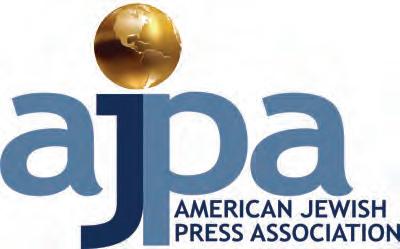

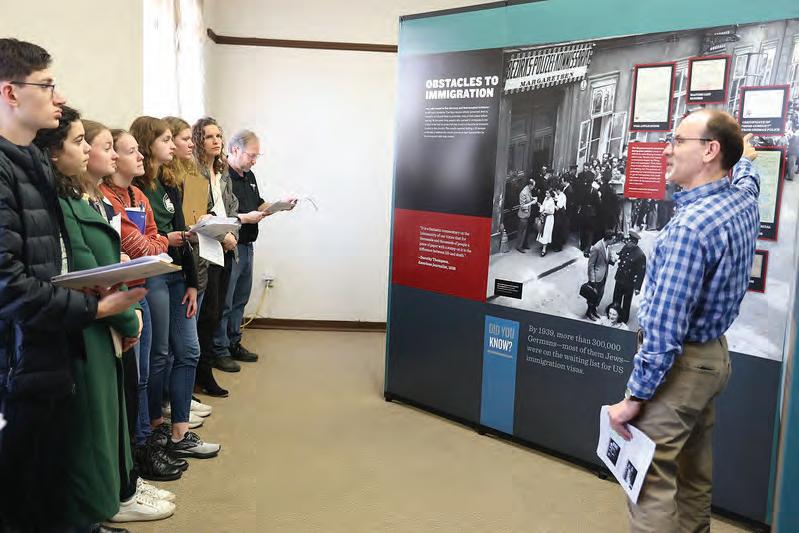
commandment — to love your neighbor as yourself, he said.
By Deborah Weisberg | Special to the Chronicle
What did Americans know of the Holocaust as it was happening, and what more could they have done?
Those questions and others are explored in an exhibition at Carnegie Free Library of Beaver Falls through April 28, as part of a 50-city tour sponsored by the United States Holocaust Memorial Museum and the National Library Association.
“Americans and the Holocaust” examines the U.S. public’s limited response to the plight of Jews seeking to escape Nazi persecution, through storyboards, interactive kiosks, films, and a series of lectures by scholars and Holocaust survivors and their families.
It is an aspect of the Holocaust “largely underexplored, even in college history classes,” said Jeffrey Cole, a professor of American history at Geneva College, a Christian institution which supported the library in acquiring the traveling exhibition for its only Pennsylvania stop.
“The focus is always on what was going on in Europe, but we forget America’s role and lack of action in all of this.”
Antisemitism was common in the U.S. in the 1930s and ’40s. A survey conducted soon after the Kristallnacht pogrom in Germany indicated that while more than 90% of Americans knew what was going on in eastern Europe, over 90% were opposed to offering help, Cole said.
“They didn’t want to get involved in the war, and the question was, ‘Do we really care about the Jews?’”
Probing the past challenges people to think about world events today and how we might learn from inaction, said Cole, who invited firstyear and past students from his honors course on genocide to lead exhibition tours for middle and high school groups, and others.
“At some point during the course, students will say, ‘What can I do? I’m only one person,’” he explained. “When I put out the call for docents, I said here’s a great opportunity for you to live into the idea that you can be an agent of change, by educating the public.”
It is an impactful way to act on a core Biblical
Volunteering resonated with Geneva junior Kiera Metcalf, 19, who said that “neighbor” goes beyond the literal to include “any human being,” each of whom should be treated with dignity and kindness.
She was particularly moved by a presentation by Deborah Stueber, the daughter of Holocaust survivors, that included a Zoom visit with her parents, both of whom are in their late 90s, in Florida.
Hearing from survivors has a powerful effect, Metcalf said.
“When we talk about the Holocaust in terms of numbers we forget that of the 6 million Jews and 13 million people total who died, each was an individual. It’s painful and difficult knowing that so many lost their lives, but beautiful to hear from survivors who went on to have families and contribute to the world.
“Seeing Deborah’s parents was a reminder of each person and that each person has a story.”
That presentation attracted a standing room only crowd of 144 people, according to interim library director Mark Attenborough.
“The fact that there are individuals still around and with living memory of the Holocaust has a particular weight to it,” he said. “It’s not so long ago that the Holocaust occurred.”
Eric Lidji, director of the Rauh Jewish History Program & Archives at the Senator John Heinz History Center, spoke about Holocaust history as it related to western Pennsylvania, including Beaver County. He worked with the Holocaust Center of Pittsburgh to create localized storyboards.
Jews comprised just 1.1 % of Beaver County’s population according to 1937-38 survey data.
An op-ed in the Beaver-Riverside Daily Times in April 1938 proposed an exchange of Nazis living in the U.S. for German and Austrian refugees. In 1939, the United Presbyterian Church in Beaver hosted presentations on the persecution of Jews in Germany, and in 1940, the Beaver County Committee for Refugee Children was established.
Jews in western Pennsylvania were paying much closer attention to what was going on in





By Adam Reinherz | Senior Staff Writer
In an effort to further a field he helped pioneer, Richard Weisberg is looking back.
The visiting professor at Carnegie Mellon University recently authored “Law, Literature, and History: A Fateful Rendezvous with the Shoah.” Published March 27 by Brill Nijhoff, the 200-page text represents Weisberg’s continued parsing of fictional writings for historical insights.
Weisberg, 80, has long been recognized for his scholarship and pragmatic contributions to law and literature. For decades, the professor and lawyer has mined works like Herman Melville’s “Billy Budd” and Albert Camus’ “The Stranger” for deeper understandings of both human behavior and the kinship of composition and jurisprudence.
In his newest work, Weisberg continues that pursuit but with an eye toward the Holocaust. By explicating William Shakespeare’s “The Merchant of Venice,” Bernard Malamud’s “The Fixer,” Günter Grass’ “The Tin Drum” and other literary pieces, Weisberg argues that a “clash” of religious values precipitated the Holocaust.
The author’s claim builds on his earlier work, including “Vichy Law and the Holocaust in France,” in which he demonstrated how lies
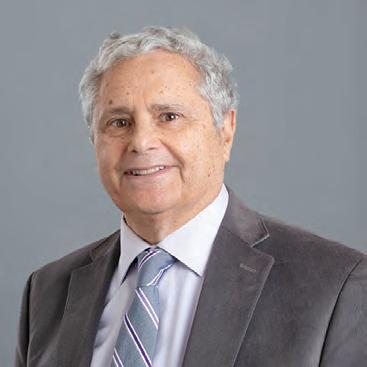
about Jews eventually became accepted legal and philosophical positions during World War II.
The Pittsburgh-based lawyer, who serves as professor emeritus of constitutional law at Cardozo School of Law and was named by former President Barack Obama to the Commission for the Preservation of America’s Heritage Abroad in 2014, has spent much of his career working on behalf of Holocaust victims and their heirs.
Weisberg’s earlier writings demonstrated how more than 200 French laws passed by the Vichy government during World War II resulted in persecution, restriction of property rights and the deportation and death of 75,000 French Jews.
Upon his retirement from Cardozo in 2021, Melanie Leslie, dean of the law school, said Weisberg’s work “has helped shape our
understanding of human rights, specifically with respect to the horrors of the Holocaust, and has made important contributions to modern legal and ethical theory.”
Five years after moving to Pittsburgh post-retirement, Weisberg said, he was compelled to write more about law, literature and its relationship to the Shoah “partly in response to the horrible events of Oct. 7 and their aftermath.”
Although work on the book predated Hamas’ invasion of Israel in 2023, and the text is not a direct response to the ongoing war, the “upsurge of antisemitism” that followed Oct. 7 necessitated a return to exploring the “ugliness of the Holocaust,” he said.
Themes within the book, such as the complexities of human conduct, touch upon subjects Weisberg has long addressed. Since the late 1970s, he has pushed scholars and the wider public to consider the link between law and literature.
The two subjects aren’t often thought of together, but practitioners of both disciplines use “words as clearly and effectively as they can to influence audiences,” Weisberg said. “Going back to the Bible — and when I say the Bible, I mean the Tanakh — storytelling and law are interwoven brilliantly. The Romans also had a sense of that unity through a figure like Cicero, who was a great rhetorician and lawyer.”
Probing the disciplines, and the manners in which each operates, generates an
understanding of human endeavors and history, he explained.
Law is largely considered an effective means of ensuring action, but “over time, stories are a more meaningful and influential vehicle,” Weisberg said.
Characters who have experienced “unjust outcomes,” such as Fyodor Dostoevsky’s Dmitri Karamazov and Albert Camus’ Meursault, help create a sense of skepticism about law, but “law itself, at least in my view, remains untouched. It’s the human actors who get things wrong.”
One look no farther than Jewish tradition, Weisberg continued, to detect this supreme “reverence” for law.
Writing in his new book, he claimed, “My belief that the Jewish allegiance to Law is the single marker of ethical soundness on earth compared to chaos, distortion, trickery, narrative violence and the death of innocents.”
Weisberg said he plans to speak more about the topic and “Law, Literature, and History: A Fateful Rendezvous with the Shoah” during an April 27 event at Beth Samuel Jewish Center in Ambridge.
Until then, he said he’s simply a “guy who now lives in Pittsburgh, who is new to the community but very interested in expanding his ties.” PJC
A dam Reinherz can be reached at areinherz@pittsburghjewishchronicle.org.




By Adam Reinherz | Senior Staff Writer
Abeloved local film festival is returning with ample opportunities for entertainment and engagement. JFilm Festival, hosted by Film Pittsburgh, is heading to theaters April 24 to May 4.
The 32nd installment of the festival offers a “diversity of stories” previously unseen, according to Paul Sloop, Film Pittsburgh’s director of programming.
“It’s quite an eclectic collection of films this year, from documentaries to narratives,” Sloop said. “We have so much variety to offer this year and a lot of really good films that I think the community is going to enjoy.”
Screenings will be held at Carnegie Mellon University’s McConomy Auditorium and The Oaks Theater in Oakmont. Streaming access to six films also is available from April 25 through May 4 in Pennsylvania, Ohio and West Virginia.
Kicking off the festival is “Midas Man,” a musical biopic exploring the life of Brian Epstein, the former manager of the Beatles. Before the screening at the Oaks Theater, Film Pittsburgh is hosting a Beatles-themed cocktail reception at 6:30 p.m.
Ten days later, the festival will close with a double feature of “Matchmaking” and “Matchmaking 2.”
There’s a level of ironic coupling with the films, Sloop said: Though “Matchmaking” was featured on opening night a few years back, “I enjoyed ‘Matchmaking 2,’ as much, maybe even a little more than the original.”
Sandwiched between “Midas Man” and “Matchmaking 2” is a slew of other films, including “Come Closer.” The movie, which won Israel’s Ophir Award for Best Picture and was the Jewish state’s official selection for the Academy Awards for Best International Feature Film, explores one woman’s experience of self-discovery after the unexpected death of her younger brother.
“It is just a really good film,” Sloop said.
Helping select this year’s slate of titles was a dedicated volunteer corps, who scoured movies from multiple genres for months before selecting “what is highly likely to resonate with the Pittsburgh audi ence,” Sloop said.
Sloop, a cinephile who also serves as Short Films programming manager at the Cleveland International Film Festival, is proud of JFilm’s lineup as well as the venues this year. And while it’s easy to claim a space on the couch and watch flicks at home, he hopes Pittsburghers venture out and expe rience the festival in person — not just to see something on the big screen, but to see something together.
“There is a sense of community that takes place in a movie theater,” he said. “There’s an element of connection that we feel when we’re in a room with other people that you don’t feel at home alone.”

“There is a sense of community that takes place in a movie theater. There’s an element of connection that we feel when we’re in a room with other people that you don’t feel at home alone.”
–PAUL SLOOP
strangers in a darkened room, or hearing from the directors themselves, being in person offers a bit more, Sloop said.
This year, attendees can record a short message for outgoing founder and executive director Kathryn Spitz Cohan. On April 10, Film Pittsburgh announced Spitz Cohan’s forthcoming retirement.
“I believe independent filmmakers have their fingers on the pulse of what’s
happening in the world, and that film is a powerful medium for change,” Spitz Cohan said in a prepared statement. “I look forward to giving back to the film festival sector as well as staying involved in the Pittsburgh arts community.”
Along with wishing Spitz Cohan well, this year’s festival will enable Pittsburghers to enjoy movies along with moviemakers on several occasions.
After seeing “Sabbath Queen,” a documentary following the life of Amichai Lau-Lavie, a descendant of rabbinic royalty, festival-goers can enjoy a Q&A with director Sandi DuBowski and Kohenet Keshira haLev Fife on April 29 at 7 p.m. at The Oaks Theater.
One day later, on April 30 at 7 p.m. at The Oaks Theater, attendees can enjoy another Q&A, this time with director/co-writer Amnon Carmi and actor/writer Ben Ducoff of “Yaniv,” a comedy about a teacher who goes to unusual lengths to support his students.

Whether it’s the responses offered by
“In the end, what I hope the festival does is remind all of us in the community that we are stronger together — to remember that we’re very diverse in thought and experience, that we always need one another, and that having one another makes a major difference in the way the world feels — and that we are able to approach and deal with whatever’s happening in the moment,” Sloop said. “All these stories are going to give the community an opportunity to reflect on that and remember it, and I hope that we help serve this moment in that way.”
Tickets, showtimes and information about JFilm Festival is available at filmpittsburgh.org. PJC
Adam Reinherz can be reached at areinherz@pittsburghjewishchronicle.org.
Submit calendar items on the Chronicle’s website, pittsburghjewishchronicle.org. Submissions also will be included in print. Events will run in the print edition beginning one month prior to the date as space allows. The deadline for submissions is Friday, noon.
SUNDAY, APRIL 20
The Jewish Genealogy Society of Pittsburgh presents “Help! I got my DNA Results, and I’m Confused!” with Gil Bardige. Join the thousands of genealogists who have been successful with Bardige’s methodologies. He will share an expanded version of his processes and techniques to prioritize matches, to get organized and feel like you can accomplish something and know what to do next. 1 p.m. $10. pghjgs.org/event-details/help-i-got-mydna-results-and-im-confused-w.
SUNDAYS, APRIL 20–JULY 27
Join Chabad of Squirrel Hill for its Men’s Tefillin Club. Services and tefillin are followed by a delicious breakfast and engaging discussions on current events. 8:30 a.m. 1700 Beechwood Blvd. chabadpgh.com.
MONDAYS, APRIL 21–JULY 21
Join the 10.27 Healing Partnership for Roll for Insight: Community-Building Role-Playing Games
Meet every other week to connect and grow with new friends through playing tabletop role-playing games designed to inspire emotional depth. They will use RPGs to explore the intersection of identity, emotional resiliency and games to fight isolation and disconnection, and to meet new people and form friendships. Free. No experience required. 16 and up. 5:30 p.m. Jewish Community Center, 5738 Forbes Ave. 1027healingpartnership.org/rpg-club.
MONDAYS, APRIL 21–JULY 28
Join Congregation Beth Shalom for a weekly
Talmudstudy. 9:15 a.m. For more information, visit bethshalompgh.org.
Join Temple Sinai for an evening of mahjong every Monday (except holidays). Whether you are just starting out or have years of experience, you are sure to enjoy the camaraderie and good times as you make new friends or cherish moments with long-term pals. All are welcome. Winners will be awarded Giant Eagle gift cards. All players should have their own mahjong cards. Contact Susan Cohen at susan_k_cohen@yahoo.com if you have questions. $5. templesinaipgh.org.
TUESDAY, APRIL 22
Chabad of Squirrel Hill is pleased to welcome Menahem Kalmanson, recipient of the 2024 Israel Prize for civilian heroism. Kalmanson will present “In Search of My Brothers.” 7 p.m. $10. 1700 Beechwood Blvd. chabadpgh.com/hero.
The Tree of Life, Rauh Jewish Archives and the 10.27 Healing Partnership present REACHing Out: a conversation with October 27th Families and Survivors. After the Oct. 27, 2018, synagogue shooting, people around the world sent objects of comfort, care and love to those directly impacted by hate. Family members and survivors share their profound experiences of both antisemitism and solidarity and reflect on what the objects sent to Pittsburgh tell us about the nature of community. 7 p.m. 123 University Place, Pittsburgh, 15213. eventbrite.com/e/reaching-outtickets-1297560230579.
WEDNESDAYS, APRIL 23–JULY 29
Temple Sinai’s Rabbi Daniel Fellman presents a weekly Parshat/Torahportionclass on site and online. Call 412-421-9715 for more information and the Zoom link.
communities in southwestern Pennsylvania.
The Squirrel Hill Health Center, Planned Parenthood and immigrant services are among the recipients of new grants from the Jewish Healthcare Foundation.
In response to policy and funding changes instituted by the Trump administration, JHF recently approved $690,000 in grants to support organizations affected by those changes.
The grants support community organizations “whose services or programmatic work align with the mission of the Foundation and that have been longtime partners of JHF while also facing volatility in federal funding, disrupting their ability to deliver services and plan for upcoming programming,” according to a JHF news release.
A grant in the amount of $250,000 was awarded to the Community Foundation for the Alleghenies, the fiscal agent for the Immigrant Funders Collaborative — a group of 18 local nonprofit organizations serving immigrants and refugees, including JFCS — to support efforts to provide services to immigrant
Bring the parashah alive and make it personally relevant and meaningful with Rabbi Mark Goodman in this weekly ParashahDiscussion: Life & Text. 12:15 p.m. For more information, visit bethshalompgh.org/life-text.
THURSDAY, APRIL 24
Yom HaShoah, or Holocaust Remembrance Day, is the day set aside to remember the approximately 6 million Jewish victims of the Holocaust. The Holocaust Center of Pittsburgh invites you to this year’s Yom HaShoah Commemoration, featuring a performance by student musicians from Pittsburgh Youth Symphony Orchestra, impactful poetry readings and a candle lighting ceremony, along with other traditional elements. 7 p.m. Free. Rodef Shalom Congregation, 4905 Fifth Ave. eventbrite. com/e/2025-yom-hashoah-commemorationregistration-1226927.
SATURDAY, MAY 3
Families with young children are invited to spend Shabbat morning with Rodef Shalom at Shabbat with You. Drop in for a light breakfast, play date, sing-along with Cantor Toby Glaser and a Shabbat activity with Family Center Director Ellie Feibus. 9 a.m. $5 per family. 4905 Fifth Ave. rodefshalom. org/shabbatwithyou.
TUESDAY, MAY 13
Join Chabad of Squirrel Hill for Pre-Shavuot Torah and Tea. Explore the “soul” of Shavuot and the meaningful lessons it o ers in our lives today. 7 p.m. Email caltein@chabadpgh.com for the location. chabadpgh.com/tea.
WEDNESDAY, MAY 14
Join JFCS for its Annual Meeting, Past, Present, Future: The Profound Impact of Community Support, as it celebrates its last year of successes and achievements while looking toward the future.
Guest speaker: Eric Lidji, Rauh Jewish Archives director. 6:30 p.m. JCC Katz Auditorium, 5738 Darlington Road. jfcspgh.org/event/ jfcs-annual-meeting-2025.
THURSDAY, MAY 15
Chabad of Squirrel Hill presents Unity Challah Bake, a challah-making workshop for men and women. Make a beautiful and delicious heartshaped challah and enjoy a bu et of assorted challah and dips. 7 p.m. $15; 1700 Beechwood Blvd. chabadpgh.com/lol.
THURSDAY, MAY 22
Join Chabad of the Squirrel Hill for Sip and Paint Night. Enjoy Israeli wine, desserts and good company while creating a beautiful painting of Jerusalem. 7 p.m. $25. 1700 Beechwood Blvd. chabadpgh.com/paint.
MONDAY, JUNE 9
Join Chabad of Squirrel Hill for The Sound of Jewish Music, a magical evening for women featuring music, dance and inspiration. 6:30 p.m. $18/adult, $10/student in advance; $25 at the door. Katz Performing Art Center, 5738 Darlington Road. soundo ewishmusic.com.
WEDNESDAY, JUNE 18
JFCS Pittsburgh presents From Stigma to Strength: Understanding Mental Health History and Managing Anxiety, exploring the evolution of mental health understanding and providing practical tools for today’s challenges. The session will dive into the historical roots of mental health stigma, discuss how current global challenges trigger anxiety and present evidence-based strategies for maintaining well-being. Virtual lecture and participation is free. 6 p.m. jfcspgh.org/ CounselingRegistration. PJC
TA $250,000 grant was awarded to the Squirrel Hill Health Center “to sustain pivotal primary care services amid uncertainty caused by federal policy changes,” according to the news release. “The funds will help fill key vacancies and support the executive team as they navigate long-term sustainability challenges.”
JHF awarded a $150,000 two-year grant to Planned Parenthood of Western Pennsylvania’s Defense Fund as a partial match to a private family foundation Challenge Grant. The funding will be used to safeguard reproductive health services and will establish a reserve to offset federal funding cuts.
And a $40,000 grant was awarded to the University of Pittsburgh to serve as a “major sponsor of a Global Innovation Summit to be held in Pittsburgh in October 2025,” according to the news release. “The funding will be used to support a panel about the region’s vision and assets for developing AI innovations to extend the HealthSpan and safety of aging populations.” PJC
— Toby Tabachnick
he Pittsburgh Jewish Chronicle invites you to join the Chronicle Book Club for its May 4 discussion of “Jews Don’t Count,” by David Baddiel. From Amazon.com: “‘Jews Don’t Count’ is a book for people who consider themselves on the right side of history. People fighting the good fight against homophobia, disablism, transphobia and, particularly, racism. People, possibly, like you.
"It is the comedian and writer David Baddiel’s contention that one type of racism has been left out of this fight. In his unique combination of close reasoning, polemic, personal experience and jokes, Baddiel argues that those who think of themselves as on the right side of history have often ignored the history of anti-Semitism . He outlines why and how, in a time of intensely heightened awareness of minorities, Jews don’t count as a real minority: and why they should.”
Your hosts
Toby Tabachnick, Chronicle editor
David Rullo, Chronicle senior staff writer
How it works
We will meet on Zoom on Sunday, May 4, at 1 p.m.
What to do
Buy: “Jews Don’t Count.” It is available at some area Barnes and Noble stores and
from online retailers, including Amazon. It is also available through the Carnegie Library system.
Email: Contact us at drullo@pittsburghjewishchronicle.org and write “Chronicle Book Club” in the subject line. We will send you a Zoom link for the discussion meeting. PJC


By JNS Staff
Cody A. Balmer, 38, of Harrisburg, Pennsylvania, was denied bail on Monday, after turning himself in to Pennsylvania State Police officers and being charged with terrorism, criminal homicide, aggravated arson, burglary and recklessly endangering lives, among other charges.
According to state police, Balmer broke into the governor’s residence at about 2 a.m. on Sunday and threw several Molotov cock tails of gasoline in Heineken bottles, causing “significant damage.”
Balmer said he targeted Gov. Josh Shapiro because of “what he wants to do to the Palestinian people,” according to a search warrant signed by state police and quoted by pennlive.com.
Fire fighters evacuated Shapiro and his family, who are Jewish and who, per the governor’s office, were asleep at the time and were not injured. Balmer’s alleged attack aimed to “affect the conduct of a government,” per the complaint.
JNS sought comment from state police about whether the attack is being investigated as a hate crime.
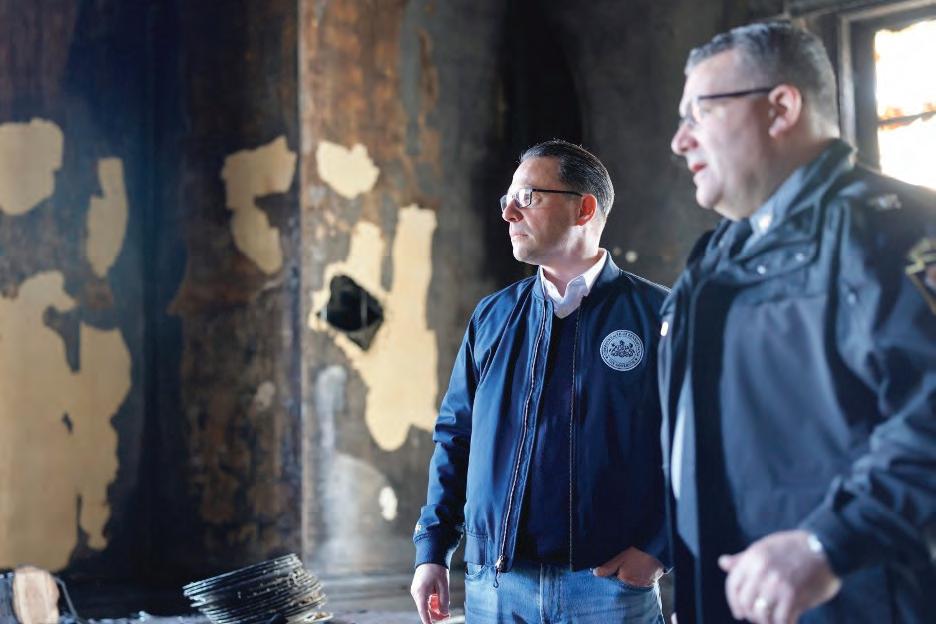
“All avenues are being explored,” Myles Snyder, communications director of the Pennsylvania State Police, said.
The governor and his wife, Lori Shapiro, and “additional guests and staff members” were in the residence at the time, per the complaint. The governor and his wife have four children.
Images that the commonwealth released showed Passover-related items among the destroyed sections of the residence.
The New York Post reported that Balmer was out on bail at the time and that his mother had asked authorities to lock him up before the attack.
The Post added that the governor celebrated Passover the prior night and that damages to the residence were estimated to be in the millions.
Balmer reportedly told police that he would
have attacked the governor with a hammer, if he found him.
The Jewish Federation of Greater Pittsburgh issued a statement following the attack saying, “We stand in solidarity with the Governor and his family and condemn this act of violence in the strongest terms. While the investigation is ongoing, the timing and location of the act are deeply troubing.”
Many governors, members of Congress and other officials commented on the attack. Some suggested that Shapiro’s faith was a factor.
Sen. Dave McCormick (R-Pa.) wrote in the Free Press that when he spoke with Shapiro on Saturday afternoon, “he ended the call by noting that he needed to go prepare for an 80-person seder which he was leading.”
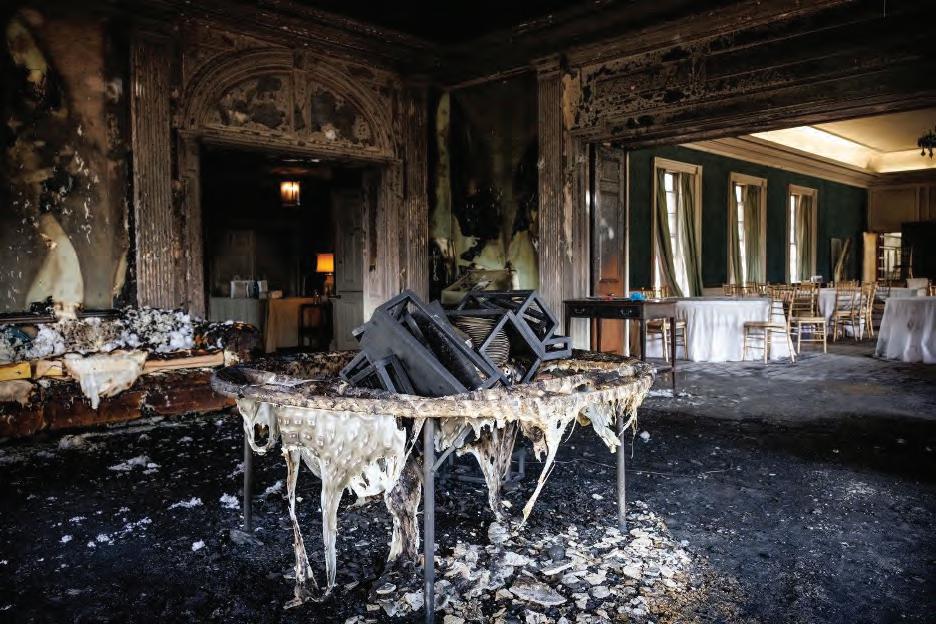
“Less than 12 hours later, he and his family were evacuated from the governor’s residence, because an arsonist had set it on fire,” McCormick wrote. “The timing of this crime in the very place where the Shapiros were observing Passover should leave us all deeply troubled.”
“Thankful my friend Josh Shapiro and his family are safe after the attack on his home,” wrote Rep. Debbie Wasserman Schultz (D-Fla.), who is Jewish.
“This barbarous, premeditated act to attack a Jewish family on Passover is unconscionable. Political violence is never acceptable, but this cuts especially deep in the Jewish community,” she said.
Minnesota Gov. Tim Waltz (D), the former
Democratic nominee for vice president, wrote that it is “despicable for this to happen as the Jewish community is celebrating Passover. Political violence has no place in our country.”
“A Jewish governor’s residence was set on fire during Passover in the United States of America in the year 2025. Let that sink in,” wrote Mark Treyger, the CEO of the Jewish Community Relations Council of New York.
“This is the same governor who was relentlessly subjected to disgusting and disgraceful slander by extremists, such as labeling him ‘genocide Josh,’” Treyger said.
The local Anti-Defamation League office called the attack “deeply disturbing” but didn’t suggest it was religiously motivated. PJC


As a classroom educator in Early Childhood at the JCC, you will be inspired, valued and supported throughout your entire tenure.
Incorporate your talents and interests into life-long learning experiences for children. With opportunities to join meaningful dialog with your peers in best practices in early childhood education, your professional growth is limitless in our Reggio Emilia-inspired early learning center.
• Competitive total compensation
• Comprehensive health and wellness benefits
• Access to an Employee Assistance Program
• FREE Family Membership at the JCC
• Discounts on Early Childhood tuition, children’s programs and day and overnight camps
• Annual opportunities for raises
• PAID professional development, and growth opportunities in leadership development
“Coming in and meeting the current staff and seeing how devoted and how warm everyone is—It’s just a very nurturing environment.”

FOR MORE INFORMATION
Squirrel Hill: Liza Baron lbaron@jccpgh.org 412-567-2695
South Hills: Cierra Bekich CBekich@jccpgh.org 412-278-1786
JCCPGH.ORG
Trump administration can deport Mahmoud Khalil over antisemitism concerns, judge rules
Mahmoud Khalil, the Palestinian protest leader arrested by ICE at Columbia University, can be deported, a federal immigration judge ruled last week, JTA reported.
The ruling by Jamee Comans, a Louisiana immigration judge, is the most significant development in Khalil’s case since he was arrested in his apartment building almost exactly a month ago and accused by the Trump administration of being “aligned to Hamas.”
But it does not mean that Khalil will immediately be deported. His lawyers were given until April 23 to request a stay of his deportation, which they plan to seek, the Associated Press reported. A New Jersey federal judge has also temporarily halted his deportation.
Khalil’s arrest split Jewish groups. Some cheered the impending deportation of an activist who, they said, led a movement that harassed Jewish students and spread antisemitic messaging. Others expressed concern about infringements on due process and civil liberties. His protest galvanized protests across the country.
Comans did not question the government’s argument that the administration may deport Khalil, who is a green card holder, on the grounds that he undermines U.S. policy goals, according to NPR.
The government had “established by
clear and convincing evidence that he is removable,” Comans said, according to the Associated Press.
If he is deported, Khalil would be sent to either Syria, where he was born, or to Algeria, where he has citizenship, according to NPR.
David Sassoon, the Jewish royal designer who dressed Princess Diana, dies at 92
David Sassoon, a former co-director of the couture house Belville Sassoon which designed over 70 outfits for Princess Diana, has died at 92, JTA reported.
The designer was born in London in 1932 to Iraqi Sephardi Jewish parents and co-led Belville Sassoon for over five decades alongside his creative partner Belinda Bellville.
Sassoon made a name for himself dressing the British royal family for decades, including some of Princess Diana’s most iconic looks, such as the going-away dress she wore after her 1981 wedding to Prince Charles.
Sassoon’s work was a key part of what made Princess Diana into a “global style icon,” author Bethan Holt told Women’s Wear Daily. His groundbreaking designs were influenced in part by his Jewish heritage.
“Jewish traditions played an enormous part in the clothes I designed,” Sassoon said in a 2023 interview with The Guardian after his designs were featured in an exhibition at the Museum of London Docklands celebrating Jewish Londoners who shaped global style.
Sassoon stopped designing in the 2000s and retired in 2012, according to InStyle. His cause of death was not announced.
Items are provided by the Center for Israel Education (israeled.org), where you can find more details.
April 18, 1996 — 106 Lebanese civilians are killed at Qana
An Israeli artillery barrage mistakenly kills 106 civilians taking shelter in a U.N. compound in the village of Qana in southern Lebanon during an anti-Hezbollah offensive, Operation Grapes of Wrath.
April 19, 1977 — Carter team meets on Middle East
President Jimmy Carter’s foreign policy team agrees on five major points for the Middle East, including a regional peace conference by the end of the year, but fails to consider that Likud might win May’s election.
April 20, 1799 — Napoleon backs Jewish claim to Palestine
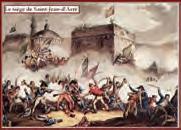
While laying siege to Turkish-held Acre, Napoleon issues a proclamation offering to give Palestine to the Jewish nation if France captures it. The proclamation fails to win the support of the Jews in the Land of Israel.
April 21, 2013 — U.S. announces anti-Iran arms deal for 3 countries
U.S. Defense Secretary Chuck Hagel
Detective Constable Ibrahim Khan of London’s Metropolitan Police was dismissed without notice for gross misconduct after posting antisemitic content on Instagram following Hamas’ Oct. 7, 2023, terrorist attack on Israel, JNS reported.
Khan, part of the force’s Community Safety Unit — which investigates hate crimes — shared posts between Oct. 17 and 23 likening Israeli Prime Minister Benjamin Netanyahu to Adolf Hitler. One image depicted Netanyahu morphing into the Nazi leader with the caption: “The irony of becoming what you once hated. Well done Israel, Hitler would be proud.”
He also posted images of a Nazi mass grave alongside what was described as a Gaza burial site, along with profane and hostile remarks toward Israelis, including claims that the Oct. 7 massacre was fabricated.
A disciplinary panel found Khan’s actions violated professional conduct standards and the IHRA definition of antisemitism. His behavior was deemed especially damaging given his role in hate crime investigations, risking public trust during a time of heightened tensions in London.
Khan denied antisemitism and challenged the IHRA definition, but was ultimately added to the College of Policing’s barred list.
Mossad’s most-senior female commander dies at 88
Ex-deputy director of the Mossad to three chiefs, Aliza Magen, passed away on Monday
at the age of 88, JNS reported.
She was the highest-ranking female to have ever served in the spy agency.
During her years in the organization, “Magen was involved in hundreds of intelligence activities and significant operations, and served in a variety of command positions both in Israel and abroad,” the Prime Minister’s Office said in a statement on behalf of the agency.
“Aliza was one of the pillars of the Mossad and left her mark on generations of Mossad personnel who were trained according to her legacy and values,” the statement read.
Magen was born in Jerusalem and joined the intelligence agency when she was 23 years old. She participated in operations including Operation Bayonet (Operation Wrath of God in Hebrew), in which the Mossad assassinated Palestinian terrorists who took part in the massacre at the 1972 Munich Olympics.
In 1990, she was promoted to the deputy director role; she served in the post under Mossad directors Shabtai Shavit, Efraim Halevy and Danny Yatom until her retirement in 1999.
Current Mossad director David Barnea, along with present and former Mossad staff, expressed deep sorrow over Magen’s death.
The “Lady in the shadows” was a “respected, trailblazing and dedicated commander, who devoted her life to the security of Israel and its citizens,” the statement from the Prime Minister’s Office added. PJC
— Compiled by Toby Tabachnick
announces that the United States will provide $10 billion in military aid to Israel, Saudi Arabia and the United Arab Emirates because of fears about Iran’s nuclear program.
April 22, 1948 — Haganah seizes Haifa
The Haganah executes a three-prong attack to secure control of all of Haifa except for the port, which the British hold, amid the violence ahead of the Israeli Declaration of Independence three weeks later.
April 23, 2014 — Palestinian Authority, Hamas briefly reconcile Hamas and the Palestinian Authority, controlled by the Fatah-led PLO, announce an end to their seven-year rift. The reconciliation does not last but does stop U.S.-facilitated Israeli-Palestinian peace negotiations.
April 24, 1903 — British offer East Africa to Herzl
Meeting with Theodor Herzl, British official Joseph Chamberlain proposes a Jewish homeland in Britishcontrolled East Africa. Herzl sees the Uganda Plan as an interim step toward the return to Israel. PJC
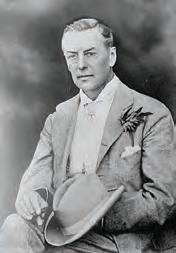




B'nai Israel:
Continued from page 1
It is for this reason that the congregation has chosen to close its doors.
“On our executive committee, the youngest people are 80 years old,” he said. “We’re between 80 and 86 and there is no backup. There is no one else to take over the reins.”
Anstandig joined B’nai Israel n 1973 after marrying and moving to White Oak with his wife, who grew up in McKeesport about a block from the congregation's first building. He saw the writing on the wall a few years ago, he said, and moved the South Hills but maintained his involvement with the congregation.
When Anstandig thinks about the meaningful moments in his life that involved B’nai Israel, he recalls bar and bat mitzvahs and his wedding — which occurred at a synagogue in Monessen because B’nai Israel was being remodeled, but was officiated by rabbis from both congregations.
He also remembered when B’nai Israel moved to White Oak nearly a quarter century ago.
“It was a really big deal,” he said, “covered by all the TV networks in Pittsburgh and there were articles in all the newspapers. We were the last Jewish congregation in McKeesport.”
Rabbi Danny Schiff, the Jewish Federation of Greater Pittsburgh’s H. Arnold and Adrien B. Gefsky Community Scholar, was the rabbi at B’nai Israel from 1993 until 2009 and shepherded the congregation through its move from McKeesport to White Oak. Schiff said he considered himself “extremely fortunate” to have had the opportunity to serve the congregation
Evidence:
Continued from page 1
activities and specifically discussed selecting Jewish targets.”
The defendants were assigned to home detention rather than jail as they await trial. The home detention includes exceptions for employment; education; religious services; medical, substance abuse, or mental health treatment; attorney visits; and court appearances.
On March 31, Hamad filed a motion to modify the conditions of his release, asking the court to lift the home detention requirement and instead impose a curfew along with the continuance of electronic monitoring. In support of his motion, Hamad stated that he “has been on home detention for approximately 152 days, with no violations of any kind reported to this Honorable Court,” and proffered several letters from friends attesting to his character.
Troy Rivetti, acting U.S. attorney for the Western District of Pennsylvania, and Carolyn J. Bloch and Nicole Vasquez Schmitt, assistant U.S. attorneys, filed an opposition to Hamad’s motion on April 8, writing that since Hamad’s arrest, a continuing investigation has “uncovered additional evidence that strongly indicates that Hamad is a danger to the community and a flight risk.”
The initial investigation, according to prosecutors, revealed that in addition to vandalizing Jewish property, Hamad “was seen wearing a Hamas-style headband and a Hamas propaganda sweatshirt,” and expressed his desire to “travel overseas to engage in violent acts and to die a martyr.” The government claims that evidence also shows he “bought explosive materials and detonated an explosive device on one
and to be its spiritual leader during the move, something he considers a unifying moment for the community.
Schiff said that while the closing of the congregation is “obviously a sad moment,” B’nai Israel can “hold its head high because it can look back on more than a century of extraordinarily powerful contributions.”
“The best you can hope for in any congre-
opportunity and in many cases that wasn’t the stereotypical big cities like New York or Chicago,” he said. “They spread out and became part of the fabric of smaller towns and cities and left a legacy and imprint on those communities in very significant ways.”
B’nai Israel’s legacy will continue to make an impact on the community. Its building has been sold, Iszauk said, and will now become
“The best you can hope for in any congregation is that you are a link in the great chain of Jewish history, and Temple B’nai Israel was.”
–RABBI DANNY SCHIFF
gation,” he said, “is that you are a link in the great chain of Jewish history, and Temple B’nai Israel was.”
Demographics, Schiff said, dictated B’nai Israel’s decision, noting that congregations — and communities — yield the stage from time to time to other congregations and communities.
“It’s the way of life,” he said. “On an individual human level, we reach peak strength and then that strength ebbs away. It’s true of communities, as well.”
Rabbi Howie Stein, B’nai Israel’s current spiritual leader, said it was an honor to serve the congregation in its final days and “bring it to a dignified closing.”
The congregation’s history, Stein said, is a lesson in the history of American Jewry.
“Jews came to this country seeking
a banquet center, something she thinks is perfect for White Oak.
The sale will help fund care of the congregation’s cemetery, which will be handled by the Jewish Cemetery and Burial Association of Western Pennsylvania.
The synagogue’s six large stained glass windows are being sent to a congregation in Illinois, which is constructing a new building that will incorporate the windows.
B’nai Israel, Anstandig said, has been working with Noah Levine and the Jewish Community Legacy Project, preparing for the closure.
“One thing he told us, I remember vividly, is that if you fail to plan, you plan to fail,” Anstandig said. “So, this whole closing concept has been going on for a year-and-a-half.”
The congregation will be in the building until

occasion with another individual.”
Since Hamad’s arrest, additional evidence was gathered by the government, according to prosecutors, including the following:
• “On March 13, 2024, Hamad threatened an individual in the comments section of an Instagram post, stating, ‘I can’t wait until the day Muslims k*ill you, I would be so happy, at this point I’m done debating. You are better off to the world not breathing.’”
• On June 6, 2024, Hamad posted on Instagram an image of himself as a child holding a gun and stating, “Been toting that K since I was a boy, don’t play with me.”
• Also on June 6, 2024, Hamad sent another image of himself holding another rifle to a colleague via Signal, an encrypted messaging
the end of May and is still working to determine what will happen with its Torah scrolls and other Judaica.
In a nod to modern times, Anstandig said, a new website is being constructed that will be a virtual home for the congregation’s yahrzeit plaques, and will contain information about the cemetery and where people are buried. It will include the history of B’nai Israel and there are plans to connect it to the Rauh Jewish Archives website.
Anstandig’s connection to the synagogue won’t be strictly virtual, though, once the building empties.
“A group of us, 12 or 15, typically get together for lunch on Wednesday and that will continue even after the temple closes. It’s a group known as Romeo’s Retired Old Men Eating Out,” he said.
In the end, Stein said, it’s important to mark both the bitter and the sweet of B’nai Israel’s closing.
“Like when a loved one dies, you want to recognize our sadness and grief but also remember the happy times and joy and do that in a dignified way that leaves a lasting imprint on the community or people we are a part of,” he said.
Weekend festivities to mark B’nai Israel’s closing include an April 25 Shabbat service and oneg, Saturday morning Shabbat service and kiddush lunch, and a dinner off site. Tours will also be given of the old temple location in McKeesport on Saturday. PJC
David Rullo can be reached at drullo@ pittsburghjewishchronicle.org.
these devices, and he detonated them in State College.”
Included in the brief are purported images of Hamad igniting one of the pipe bombs.
The U.S. attorneys further allege that around October 2024, Hamad wrote a note on his phone, discussing his ability to evade law enforcement surveillance (“I can sneak out”; “I’ve f---ed with their operations way too many times now lmao”) and that he would rather “die standing than live kneeling” if ever caught by law enforcement.
During his Air Force security clearance investigation in 2024, Hamad told investigators that he had a Lebanese passport, according to the government. While he later recanted that statement, prosecutors wrote, “it is unclear if Hamad does in fact have a Lebanese passport that is unaccounted for. Hamad has family and friends in Lebanon.”
application, with the words: “Been a terrorist since I was a kid in Lebanon, real s--t.”
• On July 4, 2024, “Hamad shared a video of an apparent Hamas funeral on his Instagram story. Superimposed on top of the video, Hamad wrote, ‘Ya Allah, I can’t take this anymore, I want to fight and die. I don’t want to live here anymore. I’m jealous of these fighters, they got to fight in the way of Allah and have achieved the highest level of Jannah.’”
Additionally, the government alleges that on July 18, 2024, Hamad drove from Pittsburgh to State College, Pennsylvania, with “two pipe bombs and at least one other destructive device made with spray paint cans in his trunk. Hamad manufactured
Arguing that Hamad’s motion for removing home detention should be denied, the government writes that had it been aware of the additional evidence at the time of Hamad’s arrest, it “likely would have sought pretrial detention.”
On April 16, Judge Christy Criswell Wiegand denied Hamad's motion to modify his detention, writing that he "does present a risk of flight and danger to the community. This includes threatening people, wanting bullets to touch the foreheads of Zionists, expressing a desire to fight and die a martyr, the fact that he has called himself a ‘terrorist’ and 'Hamas operative,' has manufactured and tested explosives, and has bragged about his ability to evade law enforcement and ‘sneak out.’” PJC
Toby Tabachnick can be reached at ttabachnick@pittsburghjewishchronicle.org.
By David Rullo | Senior Staff Writer
The American Civil Liberties Union of Pennsylvania filed a federal lawsuit April 15 against the University of Pittsburgh on behalf of Students for Justice in Palestine. The lawsuit alleges the student group’s First Amendment rights were violated when it was suspended by the university in what the ACLU calls an “apparent retaliation for the club’s political speech.”
The lawsuit follows a Feb. 4 disciplinary hearing held after SJP hosted a “study-in” at the Hillman Library that university officials said may have violated Pitt event policies. Pitt indefinitely suspended the student group after it “improperly engaged in communication to members of the Conduct Hearing Board” following the proceeding, according to a letter signed by Associate Director of
Student Conduct Jamey Mentzer.
The ACLU’s lawsuit claims that communication was an open letter signed by more than 70 university-affiliated clubs and community organizations, protesting the university’s “harassment” of SJP.
SJP has been a registered student organization since at least 2009. It has hosted and participated in numerous anti-Israel and anti-Zionist events since Oct. 7, 2023.
The group’s activities have left some Jewish students on campus feeling unsafe and troubled.
One sophomore student, who spoke to the Chronicle last semester, recounted being at Hillman Library while the “study-in” occurred. After leaving his backpack unattended for a few minutes he returned to find a note in one of its pockets that read “Free Palestine Pitt Divest Now.”
“It was just like a shocking feeling to me, because, I mean, I always wear a Star of David and a hostage tag,” he said. “So, it feels
like they had to deliberately see where I put down my stuff and then write that note and drop it in my bag. I felt like someone was watching me and I had no idea, and I’ve been so alert ever since.”
The Jewish student recounted another incident where SJP members were demonstrating in the library. He and a friend were observing the protest when someone from the group “came up to us and started taking down our descriptions, like in a notebook.”
“It’s really hard,” he said, “and it’s taken a toll on my mental health.”
Students in Support of Israel at Pitt President Matan Rieger said that he, too, has felt unsafe at times and altered his plans because of events SJP was hosting on campus. He called the ACLU filing “disheartening.”
“It’s turning it into an issue that it’s not,” he said. “It’ not regarding free speech as the lawsuit claims. It’s a shame that the ACLU is suing the university for following its own policies.”
For Laura Cherner, director of the Jewish Federation of Greater Pittsburgh’s Community Relations Council, there is a clear distinction between free speech and hate speech.
“While student organizations have the right to express their views, that freedom does not extend to promoting hostility, intimidation or discrimination. The university stated that SJP was in serious violation of its policies, and it has a responsibility to maintain an environment that is safe and welcoming for all students and one where every student has access to their education without disruption,” she said.
The ACLU is asking the court to order the university to lift SJP’s suspension and cease further disciplinary proceedings against the group.
The university had no comment on the lawsuit before press time. PJC
David Rullo can be reached at drullo@ pittsburghjewishchronicle.org.
Harvard defends its response to antisemitism in rejecting White House demands
By Grace Gilson | JTA
Harvard University was hit by a $2.2 billion federal funding freeze on Monday, hours after the school’s president announced it would not bend to a list of demands by the Trump administration that included expanding efforts to combat antisemitism on its campus.
In a letter to the Harvard community, Harvard’s President Alan Garber lambasted the Trump administration’s demands, writing that the school has actively fought antisem itism on campus and the administration’s conditions infringed on the school’s First Amendment rights.
“It makes clear that the intention is not to work with us to address antisemitism in a cooperative and constructive manner,” wrote Garber, who is Jewish. “Although some of the demands outlined by the government are aimed at combating antisemitism, the majority represent direct governmental regulation of the ‘intellectual conditions’ at Harvard.”

before the 373rd Commencement at Harvard University.
The demands included in the Trump and departments that “most fuel antisemitic harassment or reflect ideological capture,” including the school’s Middle Eastern studies
Holocaust:
Continued from page 3
Europe than the general population, and some pushed themselves to the brink of bankruptcy trying to help strangers or people they barely knew to escape the Holocaust, Lidji said.
“Imagine getting a letter out of the blue: 'I need someone to write an affidavit for me.' You’d be on the hook for $500 a week.”
Yet, fears that refugees might become burdens on the state or take jobs from American citizens limited support for immigration policies that might have saved the lives of more immigrants, one storyboard notes.
would review almost $9 billion in Harvard’s federal funding. A group of Harvard professors sought to file a temporary restraining
“It’s painful and difficult knowing that so many lost their lives, but beautiful to hear from survivors who went on to have families and contribute to the world.”
–KIERA METCALF
The exhibition has been an “eye opener” for John Sanderbeck, vice chair of the library board, who indicated that he hadn’t been taught much about America’s reaction to the Holocaust during his own education.
“I hadn’t realized how the people who wanted to escape were persecuted here. It’s an underexamined topic.”
The library spent more than a year preparing for the exhibition with input from the Holocaust
order in a federal court in Massachusetts Friday to block the administration from stripping the school’s funding.
Harvard appears to be the first elite U.S. university to push back against the White House’s demands. Six other schools have faced similar funding threats as a result of the Trump administration’s crackdown on campus antisemitism. Columbia University saw $400 million in federal funding cut amid similar accusations, but later acquiesced to the Trump administration’s demands in an effort to win them back.
Stanford’s president and provost both expressed support for Harvard’s decision to push back against the Trump adminis-
“Harvard’s objections to the letter it received are rooted in the American tradition of liberty, a tradition essential to our country’s universities, and worth defending,” Levin and Martinez wrote in a statement shared with The Stanford Daily.
Earlier this month, Princeton also saw several dozen of its federal research grants frozen. In response, the school’s president said it would “cooperate with the government in combating antisemitism.” PJC
Center of Pittsburgh and Congregation Beth Shalom, and public attendance has been “outstanding,” Sanderbeck said.
The final presentation before the exhibition leaves for its next destination addresses antisemitism today. Slated for April 27, it includes survivors and families of victims of the 2018 Pittsburgh synagogue shooting and a screening of a shortened version of the documentary “Repairing the World: Stories from the Tree of Life.” PJC
Deborah Weisberg is a freelance writer living in Pittsburgh.
Guest Columnist
Jordan Golin
Dayenu — it would have been enough. How many times have members of the Pittsburgh Jewish community used this phrase outside of Passover since 2017? How much pain and suffering can we endure?
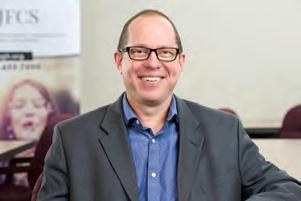
seem like an extended family.
Statistics support the idea that such events are happening more frequently. Antisemitic attacks in the United States have increased nearly 900% since 2014, according to the Anti-Defamation League. What does this mean? Imagine if food prices were to increase 900%. It’s an increase that feels almost catastrophic.
The Charlotteville Unite The Right rally in 2017
The Pittsburgh synagogue shooting in 2018
Antisemitic shootings in Poway, Jersey City, and Los Angeles in 2019 and 2023
The war in Gaza and Israel beginning in 2023
The ongoing rise in antisemitism over the past decade
The arson attack on the Pennsylvania governor’s resident this past weekend
It often feels that the world is getting darker, more hopeless and increasingly dangerous. Especially for Jews.
Even though members of our Pittsburgh Jewish community were not directly attacked in all of these incidents, it can feel as if we were. The global Jewish community is small, the American Jewish community is even smaller, and the Pittsburgh Jewish community can
rise in antisemitism. Hate crimes in general have doubled in our country during the same time period.
How do we cope with this new reality without sinking into despair?
We have long known that hopelessness and helplessness are not only common symptoms of depression but that their mitigation can
We all have the ability to take small steps to improve our community and our future.
Gen-X Jews like me grew up believing that antisemitism was a horrifying disease that had been largely controlled. The Holocaust was over. The quotas on Jewish immigrants were over. Jews were no longer restricted from going to hotels, universities and clubs (at least not openly). Sure, antisemitic activity took place from time to time, but so did anti-Black, antiwoman and anti-gay behaviors. Society was gradually moving beyond antiquated prejudices. Or so we thought.
The past decade, and especially the past several years, has clearly shown how wrong we were. We have witnessed the intense cruelty that one person can inflict on another when given fertile ground and when a climate of hate is stoked. And this hasn’t only been seen in a
actually ease emotional distress.
Hopelessness. Creating hope for the future involves a change in focus. Think about what you can do for yourself and your family to have a better future. Consider what your community needs in order to grow and thrive. Focus on people who are expressing their talent, their skills, their passion and their commitment to making the world a better place. These could be family members, friends or even members of our local government.
Helplessness. We all have the ability to take small steps to improve our community and our future. Write an email to an elected official. Participate in a rally. Show kindness toward an immigrant business owner. Volunteer in your synagogue. Most importantly, talk
about the good that you are doing so that others can join in and create a critical mass of people who are determined to rise above cynicism and divisions.
The list of incidents at the beginning of this article was upsetting. But there is also another side to Dayenu: How many positive incidents should members of our Jewish community experience in order for us to feel that there are “enough”? The truth is that we have more support than we may realize. The non-Jewish friends who check in on us. The non-Jewish organizations that support our community. The non-Jewish politicians who stand with us.
Anne Frank said, “In spite of everything, I still believe that people are really good at heart.” Even in the midst of shock and horror, we can still find goodwill and compassion. To do so, though, we need to pay attention differently. It’s often easier to take note of the negative than the positive, but both are equally real. We should focus on the people we know and care about as well as the strangers who treat us with kindness. We should engage all of them in hopeful conversations about what we want to accomplish. We should walk with them, sometimes leading and sometimes following, as we work together to create the future we desire. PJC
Jordan Golin is the president and CEO of JFCS Pittsburgh.
If we want Jewish life to survive, we must invest in the living
Guest Columnist
Mendy Cohen
Ispent eight days in Berlin this spring, visiting concentration camps, walking through Jewish neighborhoods and trying to understand how a country reckons with its past. At nearly every corner, there was a marker of memory, a stumbling stone in the sidewalk, or a plaque. At one government building, I was surprised to see a mural depicting German history that didn’t conveniently omit the 1940s: a train headed to Auschwitz. It was honest and powerful. But as I walked those streets, warned not to be visibly Jewish, it felt like some things hadn’t changed at all.

disconnected from contemporary Jewish life, it often fails to address the very antisemitism it seeks to prevent by centering Jewish identity around victimhood. If this is true about Holocaust education, how have the Jewish people continued to survive, and, in many cases, even to thrive?
What I saw in Berlin — the symbols, the history, the hatred that still lingered — made me think about my home, Pittsburgh, and how my community was choosing to remember and build forward after the Pittsburgh synagogue shooting.
Antisemitism is exploding across the world, even in the U.S., where millions of dollars have been spent on Holocaust education. It’s hard to reconcile: How is so much money spent on Holocaust education when nothing seems to change? In the U.S., there are 16 major Holocaust museums and memorials and dozens of smaller centers, including one in Pittsburgh that’s been open since 1980, yet antisemitism continues to rise.
In an article published in The Atlantic, Dara Horn, author of “People Love Dead Jews,” notes that because Holocaust education is
2014 from 73% to 56%.
Compared to other communities nationwide, Pittsburgh has more young adults and kids involved in some Jewish life. But, as Jeff Finklestein, president and CEO of the Federation, and Evan Indianer, the study’s chair, commented, more needs to be
Holocaust centers have not curbed antisemitism, but when education has proven to be a way to ensure a proud, informed Jewish identity, why do we invest so much in memorials and so little in life that is happening now?
In his paper “The Secret of Continuity,” Rabbi Jonathan Sacks offered a simple answer to this question: Jewish education. Not mass education for the public, but Jewish education for Jewish children, teaching them where they come from and what it means to be a Jew. Sacks wrote, “We live through what we learn. If we do not learn what it is to be a Jew, nothing in our environment, except antisemitism, will tell us … Jews survived, quite simply, because they devoted their best energies to education.”
A 2017 Pittsburgh Jewish community study commissioned by the Jewish Federation of Greater Pittsburgh found only 52% of Jewish children participated in some form of Jewish education, and the proportion of Pittsburgh Jews who identified either as Reform or Conservative declined since
done, and with “limited resources … we have to figure out how to use them most effectively.”
On Oct 27, 2018, less than a year after the study’s release, an antisemitic gunman murdered 11 worshippers at the Tree of Life building. The Tree of Life, a nonprofit formed after the shooting, is in the midst of a rebuilding initiative for which it aims to raise $75 million. The planned complex will encompass a synagogue for the Tree of Life Congregation, a museum focusing on the history of antisemitism in America, a center that will provide programs to educate the public about antisemitism and strategies to counteract it, and a memorial to the 11 people who lost their lives.
Carole Zawatsky, CEO of The Tree of Life
project, said rebuilding is “a story of re-creation that will never let the killer tell our story.”
In an interview with Pittsburgh Magazine, she described the goal as one of resilience, that in the face of the deadliest act of antisemitic violence in U.S. history, the Jewish people in Pittsburgh chose to “Get up and recreate … to tell our story of Jewish life in a dynamic and robust and important way.”
A moving and compelling vision that raises an important question: Is a $75 million museum, memorial and educational center the most effective way to tell that story? Will this model truly strengthen Jewish life in Pittsburgh, or is it just doing what we’ve always done: Build structures remembering how Jews died — and hope that next time the results will be different?
Pittsburgh has three Jewish day schools: Hillel Academy, Community Day School and Yeshiva Schools, all of which have taken on the challenge of providing Pittsburgh’s Jewish children with the kind of education Rabbi Sacks extolled. These schools and the broader community rely heavily on the Jewish Federation for funding each year. Tuition can approach $20,000 per child, and congregational membership fees can range from $1,300 to $1,750 annually, making full participation in Jewish life financially out of reach for many families.
So, if we were handed $75 million to shape the future of Jewish life in this city, wouldn’t it be better used to enrich and strengthen a community that needs it now?
As I spoke with members of Pittsburgh’s Jewish community, I realized I wasn’t alone
Please see Cohen, page 13
Last week, the Chronicle asked its readers in an online poll the following question:
“Do you believe Donald Trump’s tariffs on foreign goods will be beneficial to the U.S. economy?” Of the 428 people who responded, 78% said no, 18% said yes and 4% said they weren’t sure. Comments were submitted by 134 people. A few follow.
They will not be beneficial to any country’s economy, only to rich politicians who can take advantage of them for personal gain. Even a sound tariff policy would damage our economy, and the approach Trump is taking is nonsensical. He has studied neither economics nor history.
His chainsaw approach to this and many things is nuts.
Stupidest move ever, especially for a Wharton School grad! He has no understanding of tariffs and economics, just twisted obsessions with retribution. Recession is imminent.
A big problem with the tariffs is that Trump has not communicated a clear
Do you
Continued from page 12
in questioning this path forward. People are whispering. Maybe they think they’re in the minority. Perhaps they feel like they can’t speak up. But the doubt is there.
Holocaust education is vital — that’s why the U.S. has more than a dozen Holocaust museums. But Jewish continuity has never
‘Revenge politics’ helps no one
strategy or end goal. I have heard the administration give three different, mutually exclusive reasons for the tariffs: raising revenue, enhancing the U.S. position in the global market by renegotiating trade deals with other countries, and bringing manufacturing back to the U.S. Goals 1 and 2 are contradictory: If the tariffs are a negotiating tactic, you can’t also use them to raise revenue because they will likely
come from educating others about our suffering. It always comes from educating our children about their story, faith and future.
The Tree of Life project and the community’s primary focus is to Remember, Rebuild and Renew. Remembering the 11 beautiful souls who were killed on Oct. 27, 2018, is sacred. But how we rebuild and renew — that’s where we have a chance to reimagine. Holocaust centers
There will be a whopping 22 Democratic candidates for Allegheny County Court of Common Pleas judge on the May 20 primary ballot. One stands above the rest: Bryan Neft. Bryan’s extraordinary qualifications were discussed in the Chronicle article, “Meet two Jewish candidates running for judge,” April 4. Bryan is rated Highly Qualified by the Allegheny County Bar Association, is a former judicial clerk, has been a lawyer at top Pittsburgh law firms for three decades and is a tireless community volunteer. Unfortunately, Bryan has been targeted by certain progressive groups, ostensibly because he was a member of the legal team that successfully challenged the proposed anti-Israel referendum introduced by Not On Our Dime. Those groups’ introduction of revenge politics into local judicial elections is disappointing and wrong. Local judges do not decide issues relating to Israel. We just need good judges. Making the election about Israel politics is a mistake and helps no one.
Shapiro’s strength shines through domestic terror
Adam Ennis Pittsburgh
Amidst the shock and outrage that is felt over the apparent attempt to murder the governor, his family members and visitors to the Governor’s Residence, there is a great deal for which to be thankful (“Man arrested after Penn. Gov. Josh Shapiro’s home is firebombed hours after seder,” online April 14).
First and foremost, thank God that the Shapiro family and all who were present — although certainly traumatized — were not physically harmed. Although an obvious and serious security failure allowed the perpetrator to successfully scale the fence surrounding the home,
go away eventually. Goals 2 and 3 are also contradictory: You can’t restore global free trade while also bringing manufacturing back to the U.S. So, what is the real explanation for why Trump just trashed my 401k? Does anyone know?
I agree we need to put the USA first.
I’m no economist, but I see only ill effects thus far, including in terms of world relations, which, among other considerations, can and will have a long-term impact on our economic health.
The U.S. economy is strong, and may survive despite of Trump’s tariffs, not because of them. Trump has to go.
Give it time. It will work. Don’t listen to “talk” — review facts.
The last time the U.S. set up tariffs we ended in a depression. I see the same thing happening today.
Absolutely not. The current administration has destroyed an economy that had
have not curbed antisemitism, but when education has proven to be a way to ensure a proud, informed Jewish identity, why do we invest so much in memorials and so little in life that is happening now?
Remembering those taken from us doesn’t have to be limited to a memorial. It can also mean rebuilding our community and honoring their memory by investing in the Jewish schools that will sustain our future.
been steadily rising for years. If the situation doesn’t settle down quickly the only winners will be the uber wealthy who can afford to buy distressed stocks before they recover. The USA has made enemies of our friends.
Hang tough, I believe that getting this imbalance of tariffs will in the benefit the USA.
I think we are headed into a bad time unless Congress steps up and defies Trump. Costs are going up and we are suffering!
A tariff is only useful when the domestic market has a competitive product to offer against any imports. Otherwise, it’s just taking money out of the pockets of American citizens whose only option is an imported good. Also, what the hell is up with that tariff on Israel? Not cool, Mr. President! PJC
Compiled by Toby Tabachnick
Chronicle weekly poll question: Do you believe current U.S.-Iran diplomatic talks will successfully prevent military conflict? Go to pittsburghjewishchronicle.org to respond. PJC
The future is in our children. A wise community would make them its priority. PJC Mendy Cohen is a Pittsburgh native and recent University of Pittsburgh graduate. He covered the Pittsburgh synagogue shooter’s trial as an independent journalist and founded The Cohen Notebook on Substack, where a more detailed version of this piece may be found.
to get into the residence to set the fire, and to get away, he turned himself in and will face serious charges. It is also gratifying to note the overwhelming condemnation of the act and concern for the Shapiro family from figures of public life on both sides of the aisle, including FBI Director Kash Patel, who spoke with the governor and offered all of the resources of his organization to aid in the pursuit of justice.
Whatever his motivation, and just as we saw in the two attempts on the life of Donald Trump last year, this would-be killer committed an act of domestic terror, the type of crime which poses a great threat and something which we downplay or de-emphasize at our own risk.
The governor’s statement to the media in addressing the incident was perfect. He displayed the emotion that any human being who was similarly targeted would feel. He went on to be appropriately resolute and defiant, stating without equivocation that this act would in no way deter him from serving the people of Pennsylvania as he was elected to do, as well as his plan to continue to mark the Passover holiday.
At the Oct. 28, 2018, memorial service for the victims of another act of homegrown terror, Tree of Life Congregation’s Rabbi and Cantor Jeffrey Myers pleaded with our elected officials, including the many who were present, to tone down their rhetoric. Many did not listen.
As Gov. Shapiro said, there is no place for this type of act: The inclination toward violence must stop. From his lips to God’s ears.
Oren Spiegler Peters Township
We invite you to submit letters for publication. Letters must include name, address and daytime phone number; addresses and phone numbers will not be published. Letters may not exceed 500 words and may be edited for length and clarity; they cannot be returned. Send letters to: letters@pittsburghjewishchronicle.org or Pittsburgh Jewish Chronicle, 5915 Beacon St., 5th Floor, Pittsburgh, PA 15217 We regret that owing to the volume of correspondence, we cannot reply to every letter.
By Romain Chauvet | The Times of Israel
PARIS — As a Jewish woman, Levana has always been anxious about using taxis in France, especially when alone. Those concerns were compounded after the outbreak of the ongoing IsraelHamas war in 2023.
“Since Oct. 7, things have become really complicated, the doubts and the fear are really much more intense,” said the 37-year-old French-Israeli.
But that was before. For some time now, Levana has found peace of mind in a new taxi application called Monite.
“Someone told me about this app, I tried it, and what a joy it is to feel safe. It’s priceless,” said Levana, who now uses it all the time in France.
Launched last September by three Franco-Israelis, the app, similar to Uber, offers rides with taxi drivers who have a command of Hebrew and are familiar with Jewish culture.
“Many [Israelis] told us that it had become complicated to travel abroad, that they were afraid to say that they came from Israel and felt a bit of insecurity,” said Ilan Amar, one of Monite’s co-founders.


The app also quickly became popular in the greater French Jewish community due to a rise in already rampant antisemitism.
“The Jewish population of France wasn’t necessarily our specific target,” said Amar. “But in the end, our app was a breath of fresh air for Jews in France who feel
unsafe. Unfortunately, it reveals a huge problem in France.”
Since the Hamas-led onslaught of Oct. 7, 2023, in which 1,200 people in southern Israel were slaughtered and 251 kidnapped to the Gaza Strip, antisemitism has continued to increase in France.
“Ninety percent of people who use the app for the first time return to use the service again. So there’s a real repeat use, which means there’s a real sense of security.”
–ILAN AMAR
The driver was found guilty of death threats and religious discrimination, and given a suspended prison sentence of eight months by a French court last year.
“Ninety percent of people who use the app for the first time return to use the service again. So there’s a real repeat use, which means there’s a real sense of security,” said Amar.
Growing global popularity



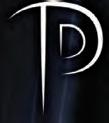





According to the last figures from the Representative Council of Jewish Institutions of France (CRIF), 1,570 antisemitic incidents were recorded in France in 2024, nearly four times the 436 recorded in 2022.
To ensure the security of both drivers and users, Monite conducts online checks of new users.
“We do a check online to see that there aren’t any real problems because sometimes you can have people who have so much hatred that they try to find a way to do harm,” said Amar. “Basically, anyone who supports or is a friend of Israel can register and use the app.”
For drivers, a video interview is required. “We had a really good job interview,” said Kevin Cohen, a taxi driver in the Paris region who has been using Monite for six months. “So in terms of safety, I would say that customers have automatic security.”
Cohen adds that feedback is very positive. “We’ve had nothing but positive comments. People feel really safe with us,” he said. “Whether it’s picking up parents at the airport or children from school, they don’t mind getting into a vehicle where they don’t have to hide their Jewishness or even change their name.”
Several stories have recently made headlines in France. A taxi driver refused a ride to a Jewish family upon their arrival at the Paris Orly Airport and called the father a “dirty Jew,” adding that if he were to give the family a ride, he would “cut your throat [and that of] your wife and your children.”
Monite has approximately 150 drivers and just over 15,000 users on the platform. The services are currently only available in four French cities — Paris, Marseille, Lyon and Nice — but given its success, the application could expand elsewhere.
“We have received a lot of requests from drivers in the United States and elsewhere in Europe,” said Amar. “So we see that it’s a real social problem in many places. We are currently working to develop the service in popular destinations for Israelis, such as the United States, the UK and Spain.”
For now, the app focuses heavily on pre-planned trips such as airport arrivals, but could also offer last-minute trips when more drivers join the platform.
“We are also working on it, but what works best today is trip pre-planning,” said Amar.
Beyond the feeling of security, Monite also strengthens bonds in the community. Cohen was able to see this in action during a soccer game between Israel and France last November at the Stade de France in Paris. The game took place under high tension and security, just days after violent antisemitic riots shook the city of Amsterdam following a similar game featuring the Maccabi Tel Aviv soccer club.
“The tension was enormous during this match with everything that was going on,” Cohen said. “It was very tense and almost impossible to find a driver. Asking an Uber to pick up an Israel supporter — I don’t think there were any. So we had to be there that day to serve the community. We feel invested with a mission.” PJC
























































































































































































By Adam Reinherz | Senior Sta Writer
It isn’t only just a dream; Jewish artist Joanna Abel and fellow dancers will float across the New Hazlett Theater’s stage on April 24 and 25 during a production of “Dragonfly Dawn.”
Abel, 42, said the show will lead audiences through a “fantastical fairy tale dance concert about good versus evil.”
“Dragonfly Dawn” begins when a cricket’s violin lures a swan to a forest lake. After the parties happily dance with dragonfly friends, a harpy attacks. The enchanted forest’s serenity is threatened by the battle. As the conflict subsides, the story culminates in a dragonfly’s final soaring display.
If the show sounds fantastic, it’s because it is, Abel said: “A lot of the, well, all of the characters are fantastical fantasy animals in a fantasy forest.”
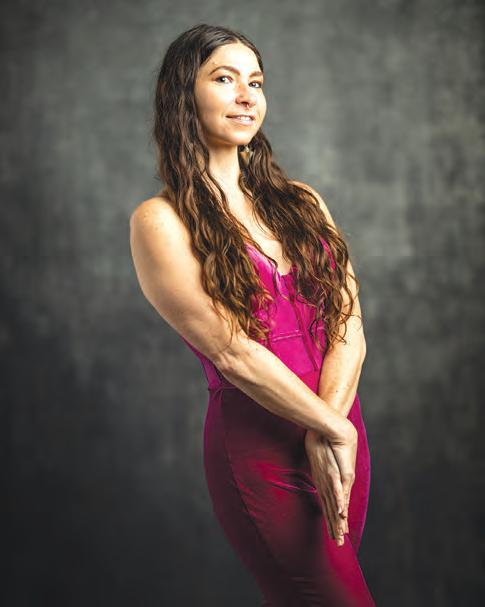
Helping push the narrative forward are “beautiful fusion dance performances, live music, aerial art and recorded music,” she added.
Abel, who was born in Squirrel Hill but grew up in Carnegie, was inspired to create “Dragonfly Dawn” by her love of fairy tales and related works.
Story’. … I love ‘Lord of the Rings.’ I like mythological creatures, fairies, dragons, mermaids and monsters,” Abel said. “I also have an event every year called ‘Enchanted Creature Ball.’”
Hosting that event spurred creation of “Dragonfly Dawn,” Abel continued, as the former involves participants not only
watching a performance but engaging in the immersive experience.
For years, Abel has encouraged Pittsburghers of all ages to explore similarly enveloping undertakings. Along with serving as a teaching artist with the Pittsburgh Cultural Trust and Pittsburgh Center for the Arts, she often works with educators and students on STEM related-matters.
Although some may be surprised by the relationship between dance, science, technology, engineering and mathematics, Abel is happy to explain.
“Each classroom is different and every lesson is custom-designed to the class, [but] if I were teaching second graders about how to solve a word problem, I am going to create a movement lesson that is helping them embody it so they can see it in a different way,” she said.
Imagine a math prompt that involves attending the circus and seeing several different artists.
Under Abel’s tutelage, the students won’t just read about two groups totaling five balancing artists; the students could try a balancing act. Then, the students could see that the five-person group of artists actually consists of two acrobats or three jugglers, who are all artists in their own right. Finally, after learning those artistic skills,
the students could return to the prompt and solve the related equation with an understanding of not only math, but the ability to see and “do it in a different way,” she said.
Abel, who leads 3rd Street Belly Dance in Carnegie, said the seriousness of the world requires increased interest in fantasy and exploration.
Whether it’s “Dragonfly Dawn,” or any creative expression, these outlets “provide the space for people to use their imagination and look at the possibilities beyond the limits of what we know,” she said. “They give us permission to dream, and to explore emotion and maybe to also process things that are happening in real life now through a different lens.”
There’s a value to dreaming, Abel said: Hopefully by seeing people dance, move and write together, it can restore a belief in “the power of collaboration and community.”
The value of community, which she routinely stresses in her dance studio, is its reminder that “good will prevail and love conquers all.”
“Dragonfly Dawn” will run April 24-25 at New Hazlett Theater. Tickets are available at newhazletttheater.org. PJC
Adam Reinherz can be reached at areinherz@pittsburghjewishchronicle.org.
This is one in a series of articles about Elder Law by Michael H. Marks., Esq.
Michael H. Marks is an elder law attorney with offices in Squirrel Hill. Send questions to michael@marks-law.com or visit www.marks-law.com.
When we mention Power Of Attorney, many people think first of the Financial Power Of Attorney: who I will choose and select to help me with financial and money matters if I need assistance.
I also prepare a Healthcare Power Of Attorney and Living Will for medical care decisions. You get to say who you authorize and appoint to be your medical care decision-maker for you when needed. It only applies during your lifetime.
There are lots of forms available for these documents, and many are free to use. The Allegheny County Bar Association together with the Allegheny County Medical Society publish a form on the Bar Association website, written jointly by doctors and lawyers.
There is also an official form in the Pennsylvania Statutes for a Healthcare Power Of Attorney and Living Will, enacted by the legislators in Harrisburg. Another document that’s in common use is one called “Five Wishes.”
The central feature of any such document is to appoint and name the person you choose as your “Health Care Agent” under Pennsylvania Law –AND your Successor Health Care Agent, backup or second choice. Other provisions usually allow you to give some guidance to your Health Care Agent as to your preferences and wishes – either as to specific medical procedures that you would or would not want someday (I always thought
that was a little silly), or in a more modern fashion, as to how you would like the decisions to be made, and what factors would be important to you for the decision-maker to consider.
You usually also have the option to specify whether any additional instructions you give your Health Care Agent are legally binding, or just expressions of your preferences and guidance for your Agent to consider.
Like all other estate planning activities, e.g. making a Will or Financial Power Of Attorney, the essential act is to write it down and sign it to make it stick later.
In a Healthcare Power of Attorney and/or Living
Will you get to say:
• WHO will be your Health Care Agent, and who will be their backup or substitute;
•WHEN it will come into effect, i.e. immediately or only later if you need help; and
• WHAT powers you want them to exercise and what decisions they can make for you.
I usually think of two closely related but somewhat distinct parts of the document: the Healthcare POA is for ordinary, lifetime, healthcare decisions (as in: tomorrow I’ll be okay, but right now I need you to make a decision for me); and, the Living Will part about end-of-life treatment instructions only starts to apply if you can’t make or communicate your own decisions, AND IN ADDITION you are about to die - that you are going to pass away despite any medical treatment that can be provided, according to the PA statutory definition. Both conditions must be met for the Living Will to become effective.
If it does apply, it says – and these are my words only – “When it’s really my time, and I’m about to
go, please let me go. Don’t keep me alive on the machines and wires and tubes and needles. Keep me comfortable and free of pain, but don’t do things that are going to drag it out and prolong my dying when I no longer actually have a chance to get better, and live again.”
When is it especially important to sign such a document? If your preferred decision-maker is not your next of kin – such as an unmarried partner, or any other friend or relative – and your next of kin may show up and try to seize control of your care decisions. Especially if there are already adverse or hostile relations, such as an estranged sibling, it’s important to have a signed Advance Health Care Directive in place, to say who you choose and appoint. Otherwise, if you are unable, unconscious, or in an end-stage medical condition, and you haven’t signed one, then PA law says that your next of kin are in charge to decide for you.

Once it is signed, who should you give a copy to? Your PCP, for sure, per the conventional wisdom.
Should you carry a copy in case of an accident? It’s a bit of a morbid thought, but it couldn’t hurt. Might depend on your own health conditions. Finally, if it’s available for free, why should you pay an attorney to prepare it for you? An estate planning or elder law attorney won’t necessarily write you a better or fancier document. Their value will be in discussing and consulting with you, advising you, and helping you think through the best way to accomplish your goals, the best people to appoint, etc. (Plus it’s usually part of a package of documents.)
At Marks Elder Law, we help people every day with issues like these. I invite your questions and feedback. Please let me know how I can help you and your family.


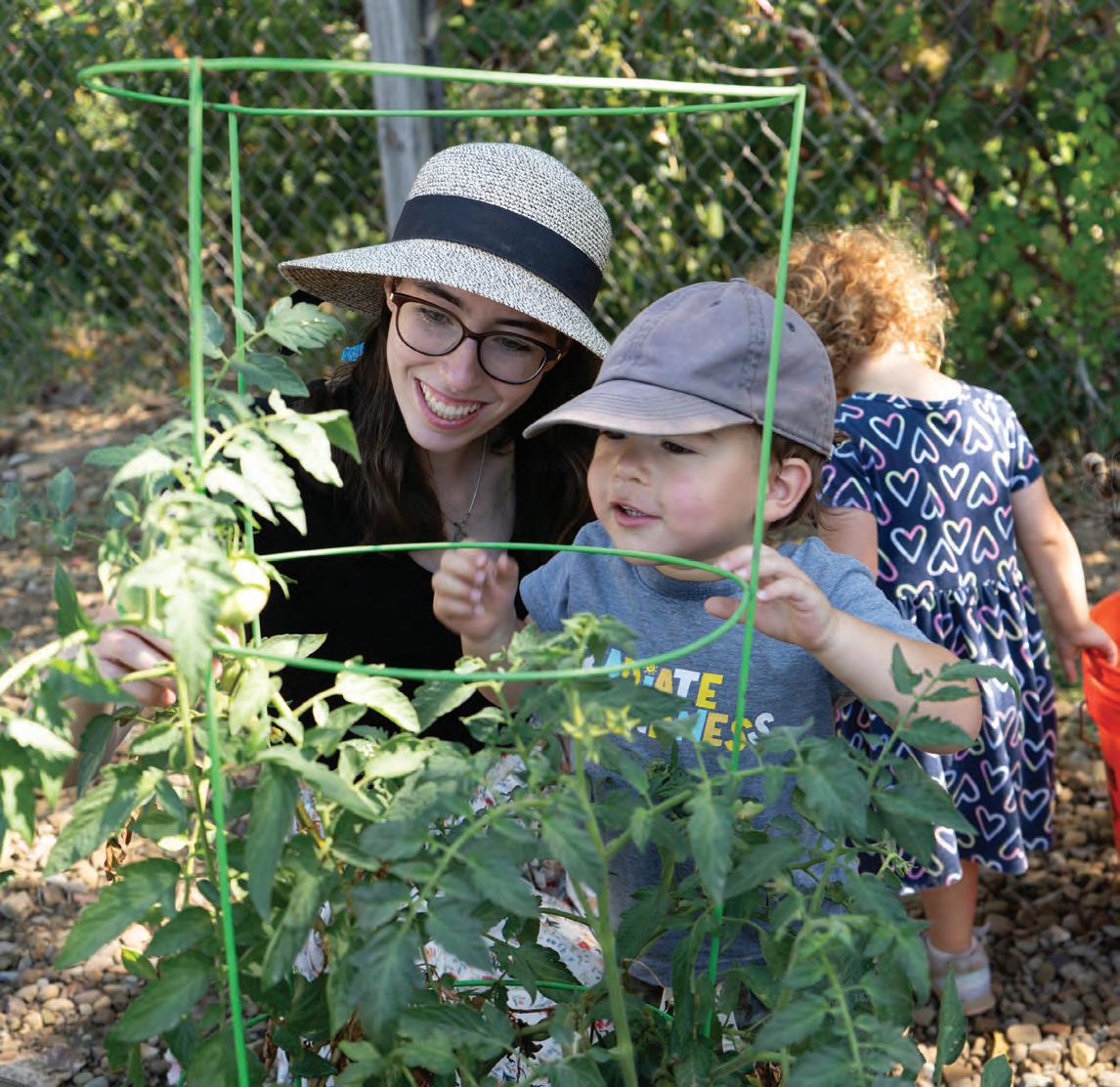
spots available Preschool and Pre-K
Our full-time, Reggio Emilia-inspired program is designed to spark curiosity, build confidence and let kids learn through play in a loving environment. Only a few spots remain—schedule your tour today and see what makes our Preschool and Pre-K so special.

Squirrel Hill: Contact Liza Baron • lbaron@jccpgh.org
South Hills: Contact Cierra Bekich • cbekich@jccpgh.org JCCPGH.org/earlychildhood






Judy and Bob Danenberg are thrilled to announce the engagement of their son Adam Samuel to Lindsey Rachel Marshall, originally of Greenwich, Connecticut. Lindsey is the daughter of Nance Marshall of Framingham, Massachusetts, and Dr. Eric Marshall of White Plains, New York. She also is the loved granddaughter of Clara Kopel of Sarasota, Florida. A spring 2026 wedding is PJC

IRabbi Sharyn Henry Shabbat Chol HaMoed Pesach
Exodus 13:17 – 15:26
hope your seders were meaningful and that you are still enjoying the matzah.
Even as I like to stay in the present as much as possible, it is true that my retirement is just over two months away. I have been looking through my archive of Chronicle articles and divrei Torah for Pesach and it looks like I return to one of just a few themes every year — my favorite, it seems, is Dayenu.
Dayenu contains 14 “if only” verses,
for the gifts we have received along the way. It is important to recognize each step in our redemption story and to celebrate it. The same is true for our own lives, the steps we take along the path to a particular goal are worth acknowledgement, gratitude and celebration. And second, it would not have been enough to have been freed from slavery, without the end of the story — not for us and not for anyone else. Until we are free and safe, and until everyone is free and safe, we are not really free.
Both things are true. The gratitude part, the thank you part, of Dayenu is essential. For what are you truly grateful? And, the “it doesn’t feel like enough” part of Dayenu? That part is true as well. Today there is struggle; we have work to do. Today we might need a bit more help, encouragement, support and patience. Maybe tomorrow it will be enough. Maybe tomorrow we will say Dayenu.





followed by the one-word chorus. The idea is that we would have been happy with the first thing; “if only” God had done this one thing for us, it would have been enough, “Dayenu.” But God did more and more and more. The first seven verses describe our redemption beginning with being taken out of Egypt and ending with passing through the sea on dry land. The second half of the verses span from having our needs met (with manna) in the wilderness to taking us into the land of Israel. The litany culminates with the building of the Temple in Jerusalem, when our lives are stable and safe and we are free.
Two thoughts: The first, we are truly grateful

That eternal optimism is one of the best things about Judaism. We open the door every year for Elijah, we hope for and we pray for and we work for the time when the teachings and rituals of the holiday come to be … when there is a final Dayenu, and the world is transformed. PJC
Rabbi Sharyn Henry is rabbi of Rodef Shalom Congregation. This column is a service of the Greater Pittsburgh Jewish Clergy Association.










Susanne M. Gollin, professor emerita of human genetics at the University of Pittsburgh School of Public Health and one of the first researchers hired by what is now the Hillman Cancer Center, died April 6, 2025, with her loving family by her side. She was 71. A respected cytogeneticist and teacher, Susanne died following a long battle with metastatic breast cancer, the disease she spent her career helping to understand and conquer. Susanne pioneered important discoveries in the field of head and neck cancer. During her career, Susanne discovered and patented the observation that loss of specific genes with parallel verexpression of other genes correlated with the development of cancer and resistance to treatment. Her discoveries showed the presence of these defects could be used both prognostically and as a guide to alternative therapeutics. As a professor, she mentored students, post-doctoral fellows, colleagues and friends. She was especially supportive of those just getting started in their careers. Susanne was a founding fellow of the American College of Medical Genetics & Genomics, the International Academy of Oral Oncology and the Indian Association of Molecular Pathologists. She was a long-term member of both the Allegheny County Board of Health and the Pennsylvania Cancer Control, Prevention, and Research Board. She was board-certified as a clinical cytogeneticist by the American Board of Medical Genetics. Susanne was an ardent sports fan. She was, for many years, a faculty representative on the University of Pittsburgh Faculty Athletic Committee overseeing the operations of the university athletics program. Susanne and Lazar loved going to see all Pitt sports teams play — dropping by the university club for lunch before catching a basketball game was a favorite past time. Chicago sports teams were also near to her heart — she watched every Northwestern game on television, and she often cheered on the Cubs and the Blackhawks. Together with husband, Lazar, she sought to make the world a more just place for all, always willing to help others. Among her many charitable activities, Susanne was on the boards of the Women’s Law Project and the Jewish Healthcare Foundation, served as the Highland Park Garden Club program director and was an elected judge of elections for her precinct. Susanne grew up in Lincolnwood, Illinois, the daughter of two physicians. She graduated from Niles West High School and obtained her undergraduate, master’s and PhD degrees at Northwestern University. She conducted post-doctoral work at the University of Rochester and the Baylor College of Medicine. Susanne served as a faculty member of the University of Arkansas Medical School before moving to Pittsburgh in the 1980s. Susanne is survived by husband, Lazar Palnick, son Jacob Palnick, sisters Roberta Lottinger and Joan Gollin Gaines, brothers-in-law Tom Lottinger and Louis Gaines, sister-in-law Rachelle Palnick, and many nieces, nephews (Austin, Stephanie, Blake, Marcella, Naomi, Andrew, Cassandra, Doron, Muriel) and godchildren (Caden, Cassia). Services were held at Temple Sinai, 5505 Forbes Avenue, Squirrel Hill. Interment at Temple Sinai Memorial Park. In lieu of flowers, please consider contributions in Susanne’s name to the University of Pittsburgh School of Public Health. Donations can be made online at giveto.pitt.edu/Gollin-memorial or mailed to: The Gollin/Gaines Family Award, University of Pittsburgh Philanthropic & Alumni Engagement, PO Box 640093, Pittsburgh, PA 15260, Attention: School of Public Health. Arrangements entrusted to Ralph Schugar Chapel, Inc. schugar.com
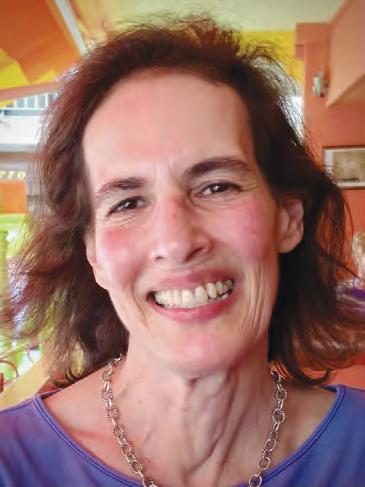
HARTZ: Deborah Nan Hartz, on Wednesday, April 9, 2025. Beloved wife of the late Joseph R. Banish. Devoted sister of Susan S. (late James) Williams. Aunt of Nan Strauss. Great-aunt of Oliver Henry Strauss Sahlman, Sebastian Robert Strauss Sahlman and Reed Alexander Strauss Sahlman. Also survived by many loving cousins. Debby loved her family and her life with Joe. Together they enjoyed gardening, kayaking, traveling and their pets. Debby will be forever missed by those who cherished her. Services were held at Rodef Shalom Congregation. Interment private. Contributions may be made to Mollie’s Meals, 200 JHF Drive, Pittsburgh, PA 15217 or a charity of the donor’s choice. Arrangements entrusted to Ralph Schugar Chapel, Inc. schugar.com
KAPLAN: Deanne Gloria Lesher Kaplan, born Dec. 14, 1940, and originally a native of Pittsburgh, passed away peacefully on April 4, 2025, at her home in Lakewood Ranch, Florida. She was a loving mother, wife, friend, grandmother and great-grandmother, who will always be remembered with much love. She made the best matzoh ball soup for Pesach, her favorite Jewish holiday. Deanne was an active member of Hadassah, and a past president of the Allentown chapter in Pennsylvania. She and her husband were very active with multiple Jewish organizations, and helped to bring knowledge of Jewish history to the world via a book that she and her husband wrote together. They also endowed the University of Pennsylvania with an extensive collection of ephemera on Jewish history. Deanne had been a teacher and a social worker prior to becoming a full-time mother to her children. She loved to travel whenever the opportunity presented itself. She was also an avid dog lover and had three chihuahuas to keep her company and on her toes. She loved all of her children, grandchildren and great-grandchildren. She was a gentle soul, loved by many and missed by all. She is predeceased by her mother, Rose Sniderman Lesher, her father, Abraham Lesher, and her brother Gerald Lesher. She is survived by her husband, Arnold Harvey Kaplan, her two daughters, Katherine (Stephen) Locke and Pamela (Martin) Ryba, her six grandchildren, Rachel, Brittany and Kevin Kendall, as well as Greyson, Maris and Asher Ryba, and her four great-grandchildren, Ashlee and Ari Kendall, as well as Bella Kendall and Cedric Kendall. A yahrzeit service will be held at the Chabad of the South Hills, 1701 McFarland Rd, Pgh, PA, 15216, on April 26, 2025, at 10 a.m., followed by a kiddush. Shiva will be held at Katherine’s home. In lieu of flowers, donations can be made to Hadassah or the ZOA. Professional services have been entrusted to a funeral home and crematory in Florida.
Please see Obituaries, page 20


Simma & Lawrence Robbins
Contact the Development department at 412-586-2690 or development@jaapgh.org for more information. THIS WEEK’S YAHRZEITS —
Sunday April 20: Sadie Gelb Braunstein, Max Fischman, A Morris Ginsburg, Edith Glosser, Celia Greenberg, Bruce Herron, Abraham Horowitz, Hannah Kamin, Isador Klein, Samuel Klein, Abraham Jacob Kwall, Bernard David Levine, Mattie Goldie Levine, Michael Liff, Rose H Lowy, David Myers, Isaac W Pettler, Max Pretter, Nettie Rosenthal, Dr Zanvel Sigal, Myer Solomon, I Weinbaum
Monday April 21: Marvin Adams, Lillian Ethel Brown, Samuel Feldman, Anna Goldman, Sidney M Levine, Florence Rosenfeld Myers, Lillian Rogoff, Sylvia Rosenfeld, Jennie R Rush, Jacob Sadwick, Solomon Stalinsky, Edith G Steiner
Tuesday April 22: Sarah Alpern, Benjamin Americus, Alter L Baker, Morris Benjamin, Morris Bergstein, Sherry Hilda Berkowitz, Sadye Burnkrant, Arthur R Cohen, Robert M Colnes, Myer Farber, Louis Freedman, Abraham Goldberg, Ida Cohen Hahn, Pfc Lee Robert Katz, Benjamin Paul Krause, Harry Levine, Fannie Mayer, Sadie Nadler, Sol Niderberg, Edward J Pearlstein, Anita Closky Rothman, Ida K Samuels, Dorothy Z Sandson, Julius Schwartz, Freda Ferber Thorpe, Emma Winer
Wednesday April 23: Isadore Ash, Jennie Breakstone, Sam Dizenfeld, Robert F Glick, Zelda Glick, Sarah Harris, Celia Jacobson, Margaret Green Kotovsky, Sam Labovitz, Mildred Levine, Ethel Mallinger, Beatrice Blumenfeld Nathan, Morris Perelstine, Marcia Ripp, Louis Rubin, William Sacks, Bess H Strauss, Bertha Swartz
















Thursday April 24: Sara Altman, Zachary Caplan, Lester Wolf Cohen, Philip M Colker, Joseph M Epstein, Isabel Glantz, Adel Horwitz, Maier Krochmal, Joseph M Lazier, Hyman Lederstein, Ben Levick, Nathan Levy, Isadore Mendelson, Rae Pariser, Leah Simon, Norma Stockman, Earl Roy Surloff, Isidor Weiss










Friday April 25: Shirley Bernstein, Fannie Caplan, Irene Elenbaum, Pearl Rebekah Friedman, Julia R Goldsmith, Louis L Goodman, Betty Shermer, Beatrice P Smizik, Leroy Supowitz, Myrle Thomashefsky Spiegel, Frieda Troffkin, Lawrence Martin Wallie, Jacob Young
Saturday April 26: Israel Blinn, Morris D Canter, Clara Esther Choder, Bennie Chotiner, Mollie S Davis, Rebecca Fineberg, Lillian Forman, Rachel Hodes, Max Kalser, Albert Katzman, Sarah Kramer, Julian H Rozner, Ida Schmidt, Henry Singer, Benjamin William Steerman, Irving M Stolzenberg, Sylvan B Sunstein, Belle Treelisky, Sara H Udman, Morris S Unger, David Whitman, Leroy L Williams
Obituaries:
Continued from page 19
SKIRBOLL: Tamara Skirboll (née Martin), 1933 – 2025. Tamara Skirboll, beloved mother, grandmother, great-grandmother, sister, cousin and friend passed away, embraced by her three daughters, on April 14, 2025, at the age of 91. She was pre-deceased by her adored husband, Leonard “Skeets” Skirboll. Born in Pittsburgh in 1933 to Stella and Hyman Martin, Tamara remained a lifelong resident of Squirrel Hill and Oakland. To generations of Pittsburghers, she was known simply as “Tamara the real estate agent,” a steady presence in the real estate realm, noted for her trusted eye and ability to bring people together, she truly loved her work. To her friends, Tamara was the one they could always count on — for unwavering support, a listening ear, style advice and the kind of laughter that could brighten any room. Her wisdom, humor, and good taste in all things, left an indelible mark on everyone lucky enough to know her. To her family, she was our beloved matriarch — “TT” — the vibrant, loving center of our world. Her strength, grace and generosity shaped our lives and our memories, and her love will
continue to guide us. Tamara is survived by her three devoted daughters: Cheryl Gerson Americus, Susan Finesman and Hilary Skirboll (Katzman); seven adoring grandchil dren, Brett (Amy), Corey (Genevieve), Ally (Ryan), Harry, Matthew (Danielle), Charlie and Maggie (Jackson); and four precious great-granddaughters, Gemma, Darcy, Thea and Sloane. Her legacy lives on through each of them, forever imprinted with her love. She touched so many lives throughout her beau tiful life. Services were held at Ralph Schugar Chapel. Interment Beth Shalom Cemetery. Contributions may be made to Weinberg Terrace, 5757 Bartlett Street, Pittsburgh, PA 15217. schugar.com PJC
the coming months, according to the Associated Press.
By Grace Gilson | JTA
AJewish family was killed Saturday when their private plane crashed en route to upstate New York to celebrate Passover.
Among those lost in Sunday’s crash were siblings Karenna Groff, 25, and Jared Groff, 26, and their parents, surgeons Michael Groff and Joy Saini. Karenna’s boyfriend James Santoro and Jared’s girlfriend Alexia Couyutas Duarte, 24, were also on board. Both couples planned to get engaged in



Michael Groff piloted the twin-engine plane which crashed in Copake, New York, after an unsuccessful landing attempt. The family’s youngest daughter, Anika, was not on board, according to the Associated Press.
Karenna Groff was the 2022 NCAA woman of the year when she played soccer for MIT. She was enrolled at NYU Grossman School of Medicine. In 2019, she played for the USA women’s soccer team at the European Maccabi Games in Budapest, Hungary.
The day of the crash, the Jewish Sports Heritage Association wished her a happy


“A real iend is one who walks in when the rest of the world walks out.”








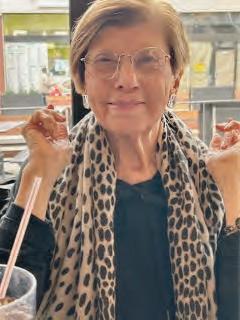

birthday in a post on Facebook. The family were set to celebrate her 25th birthday alongside their seder, according to the Jerusalem Post.
Michael Groff was a neurosurgeon at Rochester Regional Health in Western New York, having previously worked at Mass General Brigham in Boston and as an associate professor of neurosurgery at Harvard Medical School. He was the brother of Dr. Yram Groff of Pittsburgh. Joy Saini was a urogynecologist at Boston Pelvic Health & Wellness.
“He was just a very human human being,” E. Antonio Chiocca, a colleague of Michael Groff at Mass General Brigham, told the Boston Globe. “He was very well-liked, very empathetic, very charismatic, very kind. He’s Jewish so we’d say, ‘He’s a real mensch.‘”
Jared Groff was a former basketball player at Swarthmore who worked as a paralegal, and his girlfriend Alexia Couyutas Duarte, a Colombia native, had plans to attend Harvard Law School in the fall. Karenna Groff’s boyfriend, James Santoro, was also an MIT graduate and worked in investment banking.
“They were all so accomplished, but it was never about their accomplishments,” John Santoro, James’s father, told the Associated Press. “Everyone considered them such a bright spot in their life. I’m sad for myself and my family, but I’m sad for everyone else who’ve lost them too.”
THE BEST OF THE h IN YOUR EMAIL INBOX ONCE A WEEK.
THE BEST OF THE h IN YOUR EMAIL INBOX ONCE A WEEK.
THE BEST OF THE h IN YOUR EMAIL INBOX ONCE A WEEK.
An exact cause of the crash remains unknown, according to a briefing Monday by Todd Inman, an official with the National Transportation Safety Board. PJC
THE BEST OF THE h IN YOUR EMAIL INBOX ONCE A WEEK.
THE BEST OF THE h IN YOUR EMAIL INBOX ONCE A WEEK.
THE BEST OF THE h IN YOUR EMAIL INBOX ONCE A WEEK.
Sign up on the right hand side of our homepage. pittsburghjewishchronicle.org
Sign up on the right hand side of our homepage. pittsburghjewishchronicle.org
Sign up on the right hand side of our homepage. pittsburghjewishchronicle.org
Sign up on the right hand side of our homepage. pittsburghjewishchronicle.org
Sign up on the right hand side of our homepage. pittsburghjewishchronicle.org
Sign up on the right hand side of our homepage. pittsburghjewishchronicle.org

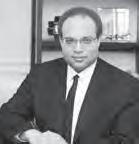























































will march in the March of the Living as living proof that the Jewish people survive despite all attempts to destroy us.”
By Jessica Steinberg | The Times of Israel
Freed hostage and violinist Agam Berger will perform at the Auschwitz-Birkenau concentration camp during the 37th March of the Living ceremony on April 24 as part of an Israeli delegation of former captives, relatives of victims of the Hamas onslaught of Oct. 7, 2023, Gaza border community residents, and Holocaust survivors.
This year’s March of the Living event will mark 80 years since the liberation of Auschwitz and the end of World War II. The Israeli delegation will be led by President Isaac Herzog and First Lady Michal Herzog and will include 80 Holocaust survivors from Israel and around the world. Polish President Andrzej Duda will also attend.
Other members of the Israeli delegation include released hostage Eli Sharabi with his brother Sharon, as well as Tzili Wenkert, grandmother of freed hostage Omer Wenkert, along with freed hostages Ori Megidish, Raaya Rotem, Hagar Brodutch, Almog Meir Jan, Moran Stella Yanai, Gadi Mozes, Aviva Siegel, Keith Siegel, Shiri Weiss and Chen Goldstein-Almog.
“I won twice — once against the Nazis and once against Hamas,” said Tzili Wenkert. “I
Bereaved members of the delegation will include Ofer Winner, father of Yahav Winner, who was murdered in Kibbutz Kfar Aza on Oct. 7, and Shaylee Atari, Yahav’s widow. Ofer Winner is also the son of a Holocaust survivor.
Several sets of parents and relatives of victims of Oct. 7 who were killed by Hamas at the Nova rave will join the delegation, including Reuven and Vered Yablonka, parents of Hanan Yablonka; Hanan and Rachel Tzarfati, parents of Ofir Tzarfati; Ilana Aline Atias, mother of Amit Buskila; and Nissim and Amit Louk, father and brother of Shani Louk.

The parents of freed hostage Omer Shem-Tov will join the group, as well as Faina and Michael Kuperstein, Holocaust survivors and the grandparents of hostage Bar Kuperstein, who is still in captivity in Gaza.
“I’ve lived a very difficult life and survived such hard times,” said Michael Kuperstein.
“I hear what those who returned are saying about the hostages, and it’s like a second Holocaust. Bar is only 23, just at the beginning of his life, with so much ahead of him. I’m 84, fighting today so that all my grandchildren and great-grandchildren will have better lives. I want all the hostages to return home so we can get our lives back.”
Agam Berger, a surveillance soldier who was
taken captive on Oct. 7 and released in January, will perform along with Kibbutz Be’eri resident Daniel Weiss — a vocalist and guitarist whose parents were both killed on Oct. 7 — playing a 130-year-old violin that survived the Holocaust and was brought to Israel.
“Standing on the stage at Birkenau is a profound and moving mission for me,” said Weiss. “Sharing this moment with Agam Berger, as she plays a violin that survived the Holocaust, is a powerful reminder of music’s ability to connect generations, to heal, and to preserve the stories that must never be forgotten.”
The Oct. 7 delegation is an initiative of the Menomadin Foundation, led by founder and president Haim Taib, in collaboration with





the World Zionist Organization, chaired by Yaakov Hagoel, and the Hostages and Missing Families Forum.
Taib said he is proud to lead the March of the Living delegation of Oct. 7 survivors and heroes for the second consecutive year.
“Never Again is Now,” said Taib, “is a message that must echo in every home around the globe. We cannot remain indifferent when we see the parallel lines between the horrors the Jewish people experienced in the Holocaust, the Oct. 7 pogrom, and the terrible days of captivity.”
The 80th year since the liberation of Auschwitz presents a moral call to action in the present and a foundation for shaping the future, said Yaakov Hagoel, chairman of the World Zionist Organization.
Hagoel added that the presence of the Israeli and Polish presidents at the event underscores the shared responsibility to preserve memory, fight antisemitism and educate future generations on the lessons of the past.
“The horrific events of Oct. 7 and the rise of antisemitism worldwide remind us how important it is to preserve our Jewish and Israeli identity, remember history, and work for a better world free of hatred and antisemitism,” said Shmuel Rosenman, chairman of the International March of the Living. “We will continue to educate about the Holocaust and to combat antisemitism on all fronts.” PJC
































ZOA: Pittsburgh scholarships awarded
Established in 1962, the Zionist Organization of America: Pittsburgh’s Scholarship to Israel Program enables local Jewish teenagers to attend structured, summer trips to Israel. Applicants are judged on their activities, Jewish and secular, volunteerism and essay on “What the State of Israel and Zionism means to me.” Scholarships are awarded with funding from endowments established by Avraham and Patti Anouchi; Harold and Marla Scheinman; the late Thelma Esman; the late Bernard and Esther Klionsky; and the Novick family, in loving memory of the late Ivan and Natalie Novick. Ivan Novick was a past national president of ZOA. This year, $1,000 scholarships were awarded to Rachel Eisenberg, Caleb Knoll and Eliora Marcus.
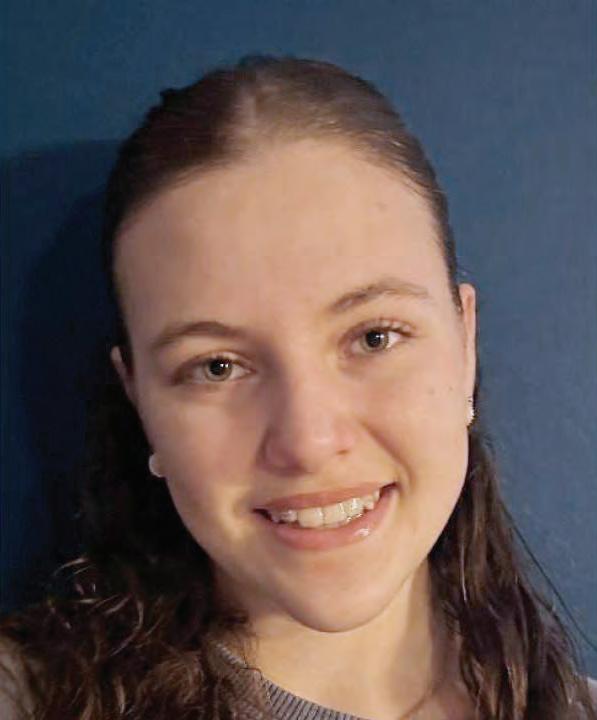
a building full of Jewish youth is electric. Their backgrounds can be different, but the single commonality is their Judaism. So much more so a country full of Jewish youth, amplifies this feeling.”
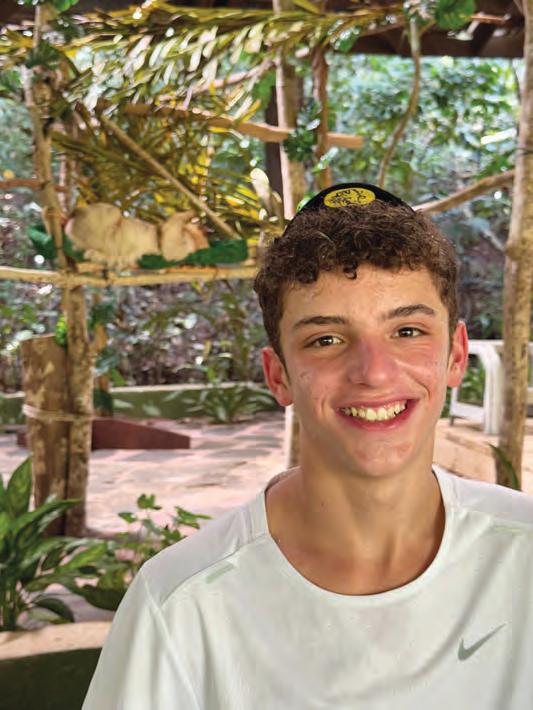
my turn to stand up for Israel, I’ll be ready — not just with knowledge, but with firsthand experience.”
There’s no other superstar Campus Superstar 2025, Hillel JUC’s annual fundraiser, honored Barbara (z”l) and Fred Gilman. The April 6 show was directed and produced by Jill Machen.
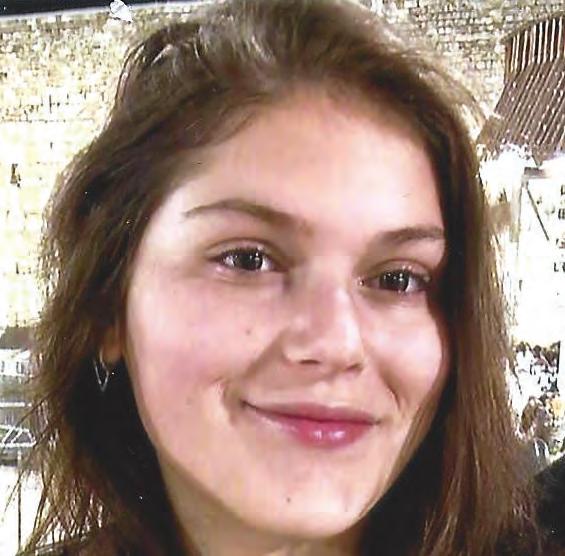
p Eliora Marcus will also be attending the NCSY camp, Israel ID. Within her winning essay, she wrote that after this trip, “I will not only know about the history and geography but will befamiliar with those places too. I will finally be home, experiencing everything I have been dreaming about.”
and Shaker
Rodney Fink was honored with the Carl Porter Award by the United States

What’s up doc?
Chabad Young Professionals and Chabad of Squirrel Hill welcomed more than 50 physicians to the Jewish Physicians

in a special presentation at the

hands
Students from Hillel Academy of Pittsburgh and Yeshiva Schools of Pittsburgh helped Our Giving Kitchen prepare for its pre-Passover store. The pop-up shop enabled Pittsburghers to acquire fruit, vegetables and eggs for purchase at little to no cost.
